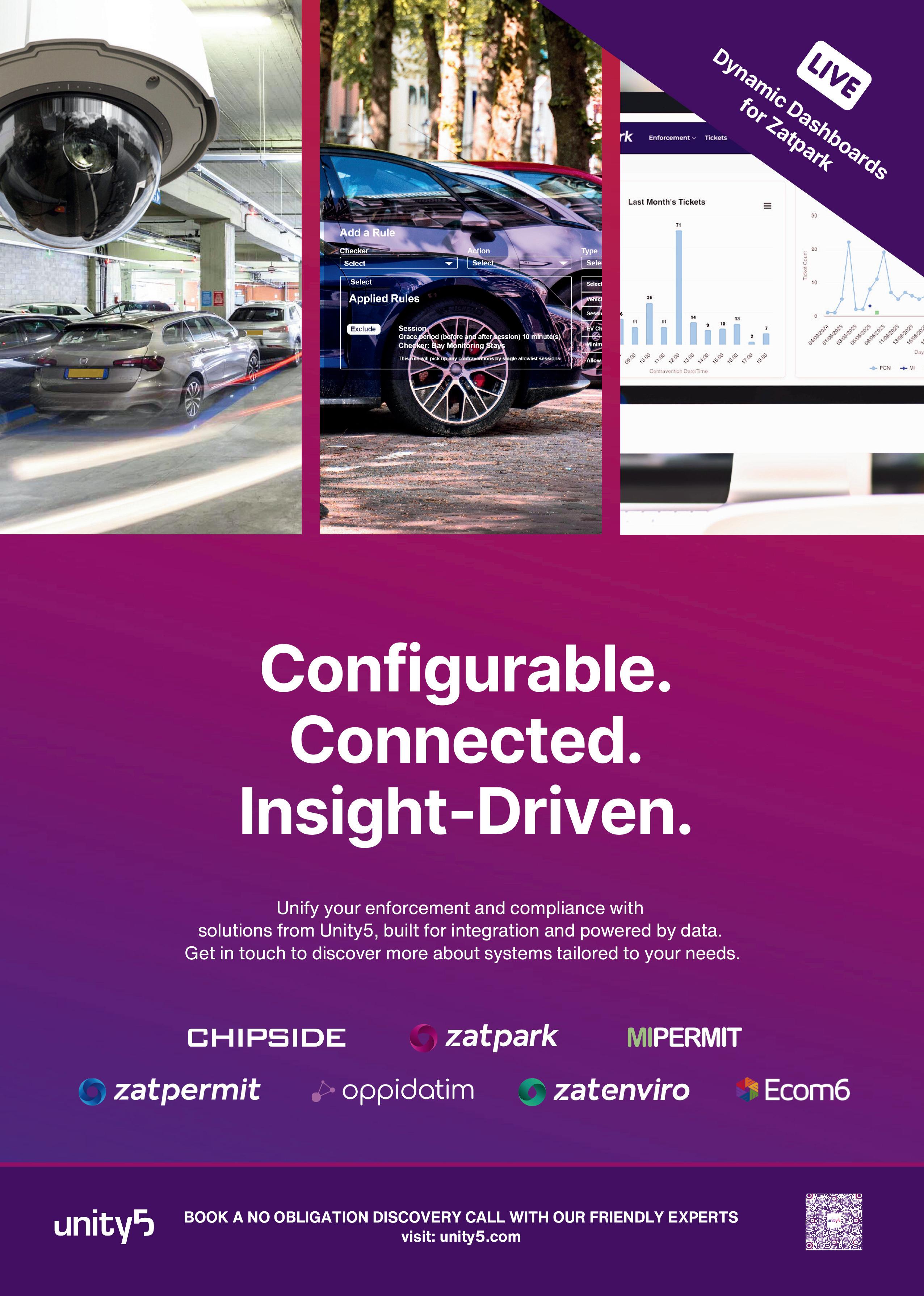


















Paul Sinha will host the British Parking Awards 2025 in London on 12 September




















Paul Sinha will host the British Parking Awards 2025 in London on 12 September

After the storming success of his appearance last year, Paul Sinha will be returning as the guest host of the British Parking Awards. Fans of ITV’s The Chase know him as ‘The Sinnerman’, ‘Sarcasm in a Suit’ and ‘The Smiling Assassin’, but Paul is, in fact, a lovely man. He has kindly stepped in for Angela Barnes, who is sadly unable to present this year. The Sinnerman wowed the British Parking Awards 2024 with a brilliant set. He will take the stage at this year’s ceremony – being held at the Royal Lancaster London on 12 September –having impressed critics and audiences with a new show at the Edinburgh Fringe, and publishing a well-received memoir called Once Sinha Lifetime: Comedy, disaster and one man’s quest for happiness.
Mark Moran Editor

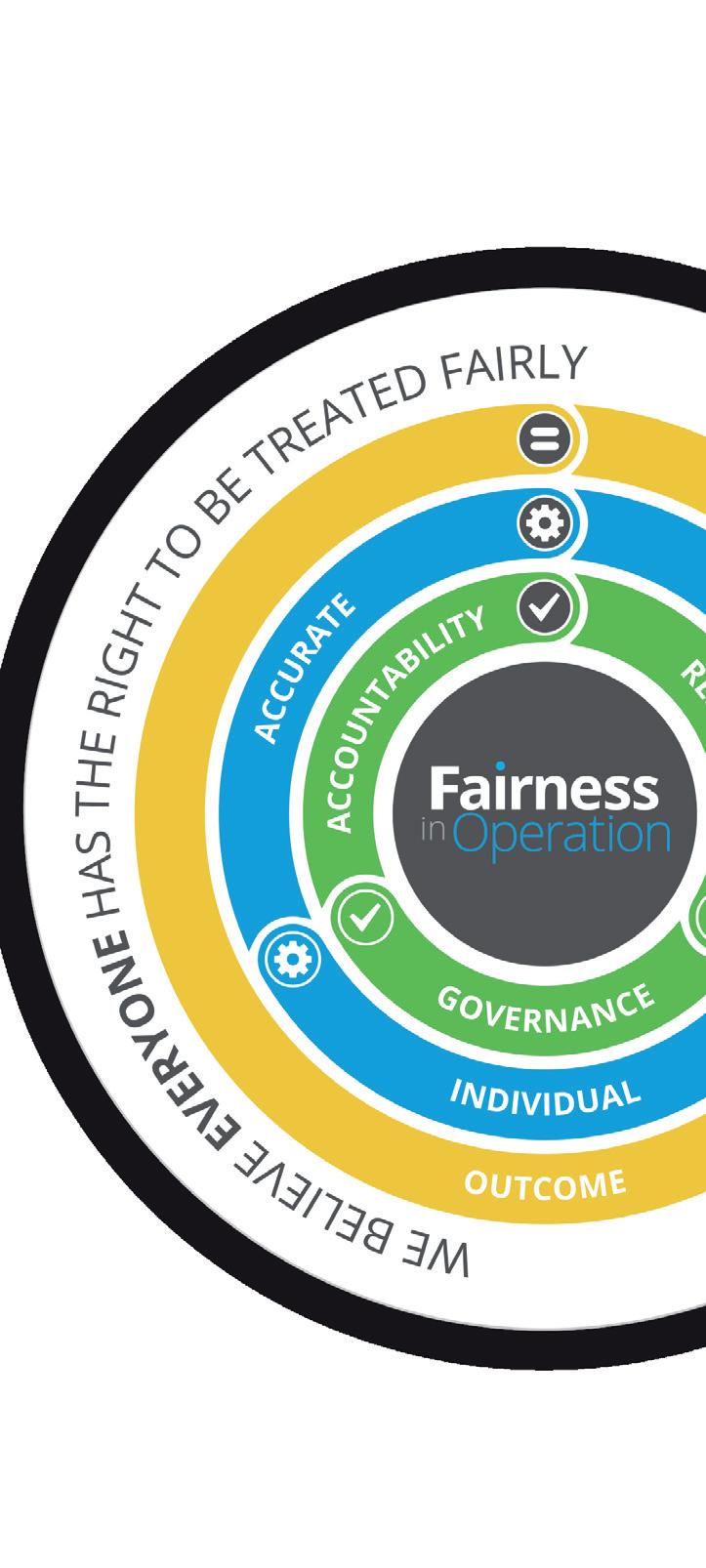


THURSDAY 2 OCTOBER 2025 CITY HALL, BRISTOL BS1 5TR


Join local authorities, transport operators, planners, developers, and mobility providers for Mobility Hubs 2025 – the UK's leading forum dedicated to the design, delivery and impact of mobility hubs.
Be part of the UK’s leading event on Mobility Hubs!
Showcase your solutions, share your expertise, and connect with key decision-makers.
Exhibitors include:








To discuss sponsorship, exhibition, or partnership opportunities, contact Jason Conby on: 020 7091 7895 or email: jason@landor.co.uk
Event Partners:

Key themes
Policy, Planning & Delivery
l Planning and funding mobility hub networks
l Integrating mobility hubs into local transport strategies
l Designing consistent, flexible, and scalable hub models
l Working with communities and artists to create a sense of place
Types of hubs
l Urban, rural, and regional mobility hubs
l Mobility hubs in new and existing residential developments
l Workplace and campus mobility hubs
l Repurposing car parks and rethinking park & ride
l Modular and small-scale rural hubs
Integrated services
l Connecting hubs with public and active transport
l Delivering shared mobility (e-bikes, scooters, car clubs)
l Providing EV charging infrastructure
l Supporting last-mile logistics and parcel services
l Managing the kerbside and public realm e昀ectively
Operations & commercial models
l Partnering with developers, operators and the private sector
l Governance and ownership models for sustainable hubs
l Creating commercially viable and user-friendly services
l Futureproofing hubs through data, tech and innovation

InstaVolt’s plans to create a charging superhub in Wiltshire


When the BBC’s Evan Davis met Q-Park’s Adam Bidder, Modaxo’s Ashley Bijster and JustPark’s Anthony Eskinazi
Parking operator APCOA showcases its sustainable credentials and PayByPhone unveils a new leadership structure in the UK
Mike Marrs commenced his second term as president of the British Parking Association with wit and good humour
Cornwall Council’s Blue Badge awareness campaign idea wins a Parking and Traffic Regulation Outside London competition
Prime minister Keir Starmer has announced a plan to review edge safety regulations for multi-storey car parks
NCP installs pick-up lockers nationwide while Q-Park is offering automated left luggage facilities at a central London car park
Blue Badge holders are facing obstacles when trying to use supermarket car parks and charge electric vehicles
The latest developments in electric vehicle infrastructure
020 7091
Huseyin
020 7091 7872 deniz.huseyin@landor.co.uk









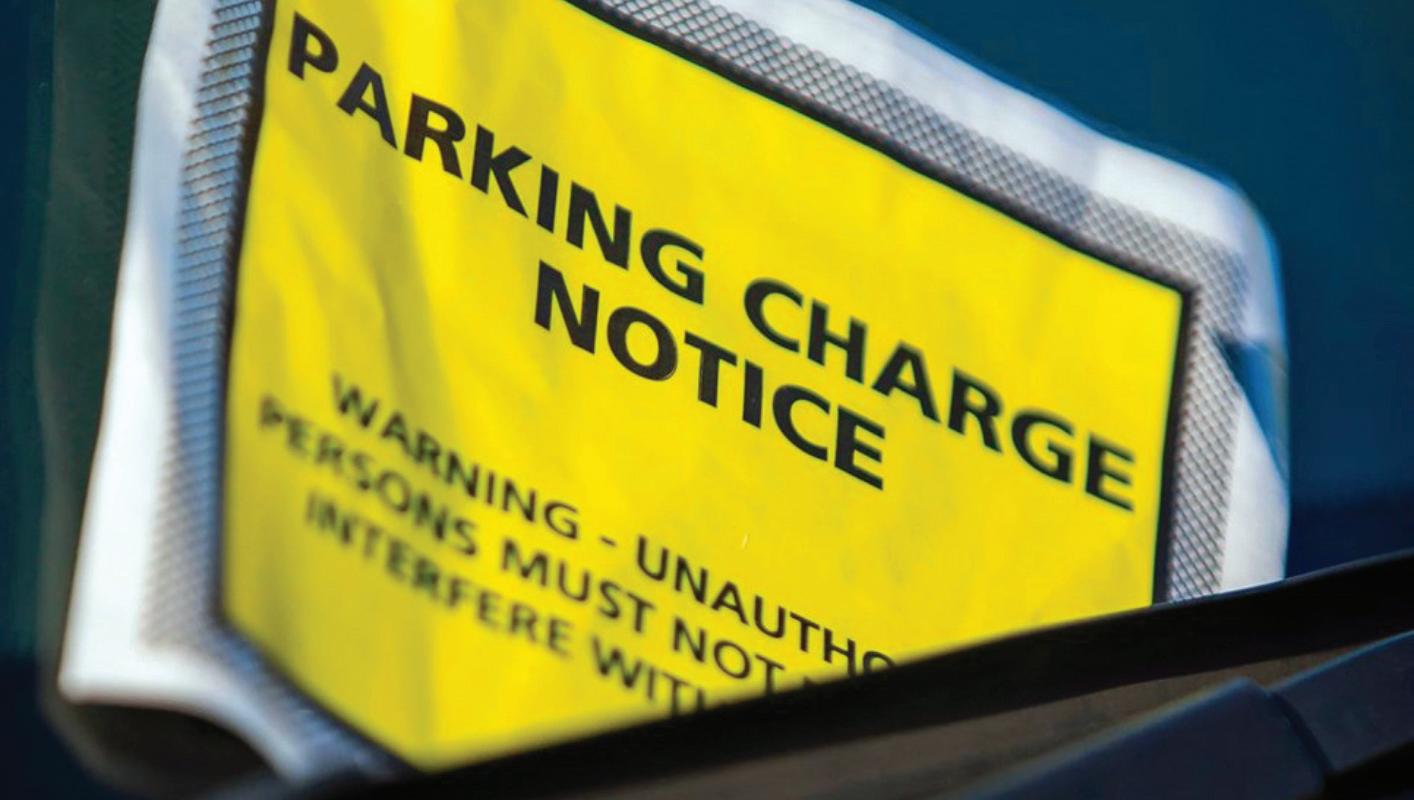
Views sought on government’s revised private parking code of practice for management of parking on private land
The government has launched a consultation on a new Private Parking Code of Practice. The code is designed to ensure fair treatment for motorists by introducing changes such as clear signage and mandatory grace periods. It is hoped that these measures will help prevent charges caused by issues such as payment machine errors, accidental typos, or poor mobile signal.
The requirement for the government to create a code was created under the Parking (Code of Practice) Act. The new version of the code being consulted on would supersede one withdrawn in 2022 following legal challenges by some parking operators. When reintroduced, the government Private Parking Code of Practice would replace a code jointly devised by the British Parking Association and International Parking Community. This sector code covers members of the association’s approved operator schemes, membership of which enables access to the DVLA database.
The government says its revised code aims to strike a balance by protecting motorists while enabling compliant operators to run efficient and value-for-money car parks.
Under the proposals, operators who breach the code may lose access to DVLA vehicle data required to issue parking charge notices.
The Ministry of Housing, Communities and Local Government (MHCLG) states that the number of parking charges issued is at a record high. Some 12.8 million vehicle keeper requests were made to DVLA last year, a 673% increase since 2012. While this partly reflects more parking spaces, the government says the current system lacks independent oversight and sufficient transparency.
The government argues that, at present, parking operators can avoid sanctions for poor practice, leaving motorists vul-
nerable to unfair or incorrect charges. It argues the new compliance framework will ensure accountability, with the loss of access to DVLA data a major sanction.
To support drivers in vulnerable or stressful situations, such as attending hospital appointments, a new rule is being considered that would uphold appeals where motorists had no reasonable choice but to breach parking terms.
The eight-week consultation also seeks views on:
• appropriate caps for parking charges and debt recovery fees
• improvements to second-stage appeals
• requirements for operators to share data with government to inform future updates to the code.
The government is also consulting on retaining the parking charge notice cap at £100, as per the current industry code. It would ask a new Scrutiny and Oversight Board to assess and analyse the cap on a biennial basis and make recommendations to the Secretary of State who has a duty to keep the code under review.
It will also look at an appropriate level for the cap on debt recovery fees. The MHCLG has received evidence that the cap of £70 currently in the Industry Code enables charging of debt recovery fees which are disproportionately high, and out of step with similar industries. The MHCLG says it does not currently have convincing evidence that the debt recovery fee is serving its intended objective of acting as an incentive to encourage payment in appropriate cases, rather than increasing costs unnecessarily by prolonging legal processes in cases without merit. Current data suggests that only 14% of cases are paid during the debt recovery stage.
Launching the consultation, local growth minister Alex Norris said: “From shopping on your local high street to visiting a loved one in hospital, parking is part of everyday life. But too many people are being unfairly penalised. That’s why our code will tackle misleading tactics and confusing processes, bringing vital oversight and transparency to raise standards across the board. This is another example of how we are fixing the things that really impact people’s day-to-day lives, as part of the Plan for Change.”
Alex Norris sets the government’s aims
For the 35 million people in Britain who rely on cars as their main means of transport, the ability to park with peace of mind isn’t just about convenience. It is vital for their quality of life. It means not having to think twice about shopping locally or popping out to see friends and family, knowing that charges are fair and the rules are clear. Parking without fear of an unjustified parking charge is good for boosting local economies and our social fabric.
The UK private parking industry plays an important role in supporting our local economies and high streets. But we continue to hear reports of poor behaviour by parking operators that make it difficult for motorists to comply with the terms and conditions of parking and leave them open to parking charges and escalating costs. These operators tarnish the reputation of those in the industry who strive to provide quality parking facilities and services. That’s bad for motorists, industry and the economy. And it’s bad for growth.
There is considerable evidence that the public want transparency, and they want to see parking operators who engage in poor practices held to account. Parliament, as long ago as 2019, decided that there should be a government code of practice for private parking, and there is no justification for further delay in complying with Parliament’s direction.
This government wants to make swift progress to support and protect motorists, without penalising those private operators who run their car parks well. The parking industry’s two trade associations recently published a single industry code of practice which replaced the two different codes they had. But more needs to be done to raise standards and to hold parking operators to account.
The consultation sets out our proposals for achieving this through both a new government code of practice aimed at further driving up standards and a new robust compliance framework for parking operators that will ensure that motorists have trust in the system. Whilst we consider these proposals the best way to raise standards, we remain open minded about what course of action to take.
Motoring and parking organisations respond
Motoring organisation the RAC has welcomed the proposed new code of practice for parking on private land. RAC head of policy Simon Williams said: “We desperately need a government-backed private parking code of practice to be brought into force to protect drivers. It’s important to realise this latest consultation is only happening because the industry successfully prevented the code being put in place after an Act of Parliament was passed six years ago. We must now ensure that whatever the government introduces has sufficient teeth to make a real difference to drivers. We urge every driver who has been issued a parking charge notice that they didn’t feel was fair to share their views on the consultation.”
The AA expressed concerns about a suggested £100 cap on parking charges, which is higher than the £50 previously proposed. Jack Cousens, head of roads policy, said: “This long-awaited consultation will not please drivers and suggests that government is bending the knee to the private parking industry. We urge all drivers to complete the consultation and submit their views and experiences when dealing with private parking firms. If government can understand the depth of contempt drivers hold against some of these shark-like businesses, maybe it will do more to help innocent drivers.”
The British Parking Association said it would continue to make the case for effective enforcement. “Without proper enforcement, parking quickly becomes a free-for-all, with some people taking advantage at the expense of others. When spaces are misused, it’s often at the expense of those who need them most, such as disabled people, parents with young children and local residents. We believe parking systems must strike a balance: they should deter selfish and anti-social behaviour, but they must also be fair, proportionate, and transparent.”
Private companies issue 14.4 million parking charge notices in single year, the RAC reports

Private parking companies have issued a record 14.4 million tickets to drivers in a single year, says motoring organisation the RAC. Some 14,371,841 parking charge notices (PCNs) were issued on private land, according to RAC analysis of government data for the year ending March 2025.
Requests to the DVLA from car park management companies for vehicle keeper details show the equivalent of almost 1.2m a month (1,197,653) or nearly 40,000 a day (39,375) were made.
The motoring organisation suggests that as each parking charge notice (PCN) could cost up to £100 this means drivers could be paying out up to £1.4bn, unless they successfully appeal or decide to pay up at the discounted rate.
The figure of 14.4 million is more than double the number six years ago (6,808,344 in 2018-19), just before the government passed an Act of Parliament intended to regulate private parking operators. It is also 13% up on the 12.8m seen in 2023/2024.
The government’s Private Parking Code of Practice was withdrawn in 2022 following legal challenges from private parking and debt recovery companies.
RAC head of policy Simon Williams said: “Sadly, our prediction earlier this year that private parking companies were on course to issue around 14.5m tickets to drivers for alleged contraventions has come true. This is more than double the number issued six years ago before the government passed an Act of Parliament intended to clamp down on the dubious practices of too many private parking operators.
“Unfortunately, the government-backed code is still not in force which means drivers don’t have the protection it was intended to provide. As it is, too many unfair tickets are still being handed out by operators who haven’t been forced to adhere to stricter rules and too many drivers are still being hounded by debt collection companies. And, we still don’t have a single, truly independent appeals service that drivers can go to if their initial appeal to the operator concerned is rejected.
“We don’t believe the parking industry’s argument that PCNs are only at record levels purely because they’re managing more car parks. We urge the government to ensure the official code is launched this year with all the protection it was intended to have so that we don’t see these figures go even higher in the future.”
The RAC is also calling for the private parking sector to publish ‘full and transparent’ complaints data to back up its claims that drivers who challenge tickets do often succeed. The motoring organisation says the industry’s two trade associations – the British Parking Association (BPA) and the International Parking Community (IPC) – do not publish information about the number of complaints member companies receive about the parking charge notices (PCNs) they issue, nor how many the companies then cancel.
The UK government is currently consulting on a new code of practice for the private parking sector.
The RAC is calling for the private parking sector to publish ‘full and transparent’ complaints data to back up its claims that drivers who challenge tickets do often succeed. The motoring organisation says the industry’s two trade associations – the British Parking Association (BPA) and the International Parking Community (IPC) – do not publish information about the number of complaints member companies receive about the parking charge notices (PCNs) they issue, nor how many the companies then cancel.
The RAC is also concerned about a lack of data relating to the second-stage appeals process, which is open to drivers after their cases have been refused by car park management companies.
There are currently two second-stage appeals bodies listening to the cases of drivers issued PCNs. These bodies were set up by the two trade associations, which run rival Approved Operator Schemes for parking companies:
• IPC: The Independent Appeals Service
• BPA: Parking on Private Land Appeals.
The RAC describes the data IAS and POPLA publishes as limited, out of date and lacking key information such as the percentage of appeals that are allowed and refused.
The IPC’s Independent Appeals Service (IAS), which has published its 2024 report, does not reveal how many appeals were allowed or refused. The last time the IAS did publish this information was in 2021/2022 when just 6% of appeals were allowed at adjudication, meaning 94% were found in favour of operators.
The BPA’s Parking on Private Land Appeals (POPLA) is yet to publish its annual report for 2024 which covers 1 October 2023 to 30 September 2024.
The RAC says that POPLA is more transparent in its annual reports. Its most recent report for 2022/2023 shows 42% of cases resulted in parking charge notices being cancelled, either due to operators conceding or following an adjudication decision (37,125 out of 88,626 appeals that went through the POPLA process).
The RAC calculates that the 42% is made up 25% of appeals being cancelled by the operator (22,285 not contested by operators, out of all appeals received) and 17% being allowed at adjudication (14,840 allowed, out of all appeals received).
Looking solely at adjudicated appeals, the data in the POPLA 2022/2023 report shows it allowed 22% of cases and refused 78% (14,840 allowed and 51,501 refused, out of 66,341 appeals decided).
RAC analysis of government data, published in July 2025, found that private parking firms made a record 14.4 million requests to the DVLA for vehicle keeper details in the 2024/25 financial year – the equivalent of nearly 40,000 a day.
RAC head of policy Simon Williams said: “After we predicted that private parking companies were on track to issue 14.5m tickets in the space of just a year, the
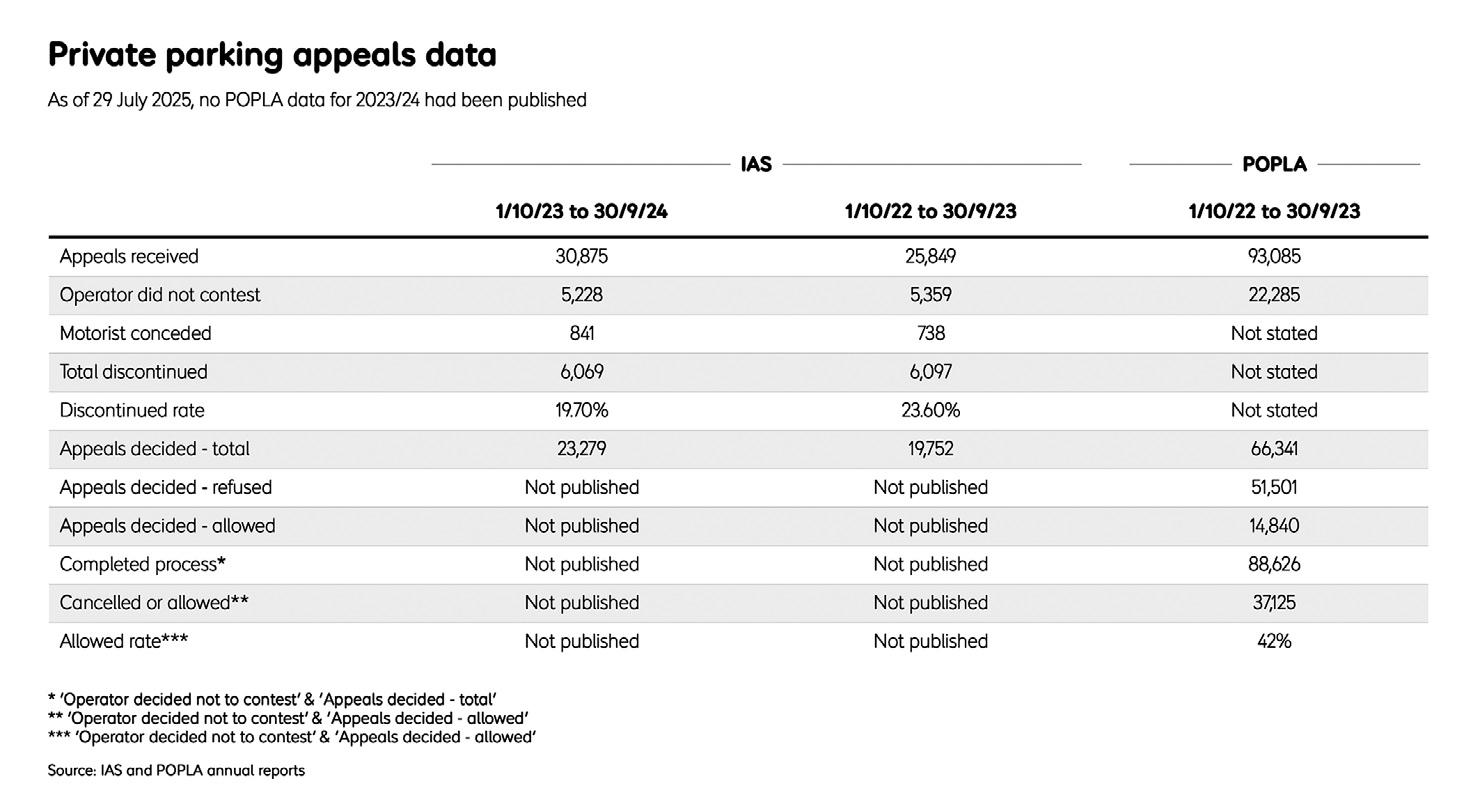
The RAC calls for parking associations to be more transparent on outcomes of appeals against parking charge notices
industry claimed there wasn’t an issue with tickets being issued unfairly and drivers are often successful in getting them overturned when they appeal.
“While stories of drivers being treated poorly are all too common, data on the true number of complaints made to operators isn’t available. Even the information published by the industry’s two appeals bodies in their annual reports isn’t that revealing due to it either being out of date or scant. With the government now consulting on what should be in the official Private Parking Code of Practice, we wanted to draw attention to the current lack of data about complaints.
“We believe the industry should have to publish the volume of complaints made to operators, including the reasons tickets were issued and the nature of the complaints, and whether or not they were cancelled.
“In the meantime, we call on the private parking industry to voluntarily publish full and transparent complaints and appeals data. We also urge POPLA to publish its 2024 annual report as soon as possible and for the Independent Appeals Service to update its report with the percentage of appeals that it allows and refuses.”
Previously published RAC research found very few drivers (3%) believe private parking companies operate reasonably, while most think their enforcement policies are too heavy-handed (55%).
The RAC Opinion Panel online survey was conducted with 1,847 drivers from 20-28 August 2024. It found that drivers were also frustrated that the Private Parking Code of Practice is still not in force some six years after the Parking (Code of Practice) Act was passed, with eight-in-10 drivers (84%) believing it is not right that the official code still has not been introduced.
The government’s consultation on the official Private Parking Code of Practice runs until 5 September.
International Parking Community: “We are currently reviewing the government’s consultation and remain committed to improving the transparency and accountability of private land parking practices. Our goal is to ensure that parking remains available for those who need it, when and where they need it, and managed in a fair, effective and responsible manner. We encourage Mr Williams and the RAC to work constructively with us.
“If there are specific improvements they would like to see, we are more than willing to meet and explore what can be achieved together. It is worth reminding the public just how often they are able to park without any difficulty or disruption. That is the clearest sign that the sector is working, when parking is smooth, accessible, and uneventful. That success tends to go unnoticed, but it is precisely what a well-managed system delivers every day across the UK.
“Unfortunately, much of the recent criticism directed at the private parking sector appears aimed more at boosting media profile than driving meaningful change. It’s also important to highlight that some of the proposals previously backed by the RAC would unfairly increase the cost of motoring for the vast majority of drivers, those who follow the rules, in order to subsidise those who routinely flout them, including by parking in disabled bays.”
The British Parking Association: “POPLA is an independent body, and as such, we cannot speak to the timing of their report releases. However, as the RAC acknowledges, POPLA has demonstrated a commitment to transparency, and we continue to have full confidence in their processes.
“With a public consultation currently underway, we believe it is more constructive for concerns to be raised through the appropriate official channels. It is important that the consultation process remains impartial and grounded in evidence, rather than being shaped by commentary in the media.”
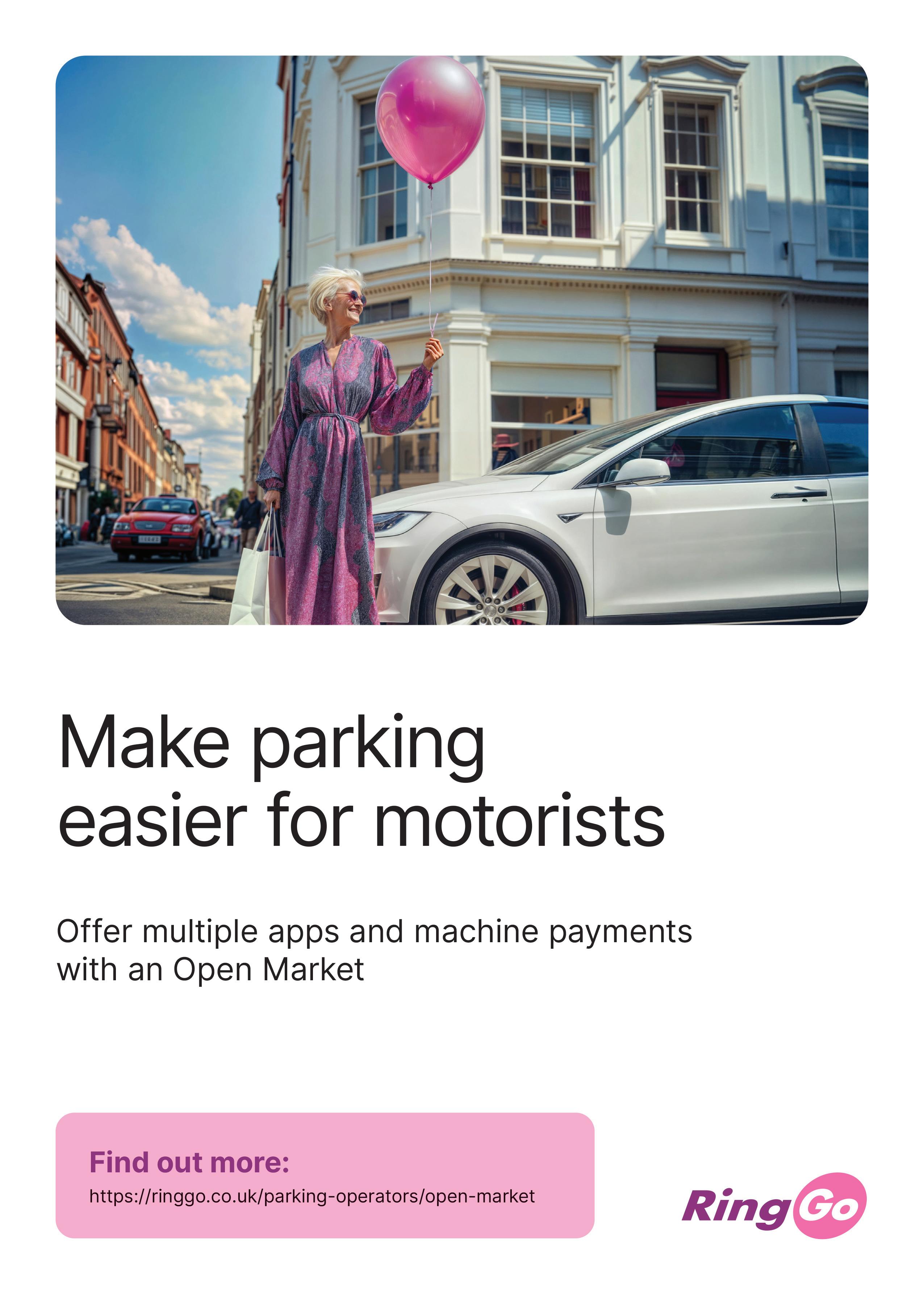
DfT will assess results of enforcement action in Dorset resorts
Significantly increased parking fines will be handed out to drivers who break the law on roads near seafronts in Dorset throughout August.
The new enforcement regime covering the coast between Sandbanks and Southbourne forms part of Bournemouth, Christchurch and Poole (BCP) Council’s work to improve safety for visitors and residents.
The Department for Transport (DfT) approved BCP Council’s request for a trial of tougher measures to tackle irresponsible and dangerous parking. The trial aims to test whether higher fines will act as a deterrent to illegal, dangerous or inconsiderate parking in busy seafront areas during the high season.
Following the trial, the DfT will assess the results and feedback from the trial and decide on the next steps.
The trial comes in response to repeated surges in illegal parking on seafront roads during the peak summer period, More than 4,000 penalty charge notices (PCNs) were issued to motorists during the three busiest weekends this year so far.
Cllr Richard Herrett, portfolio holder for destination, leisure and commercial operations, said:
An illegally car being lifted by BCP Council

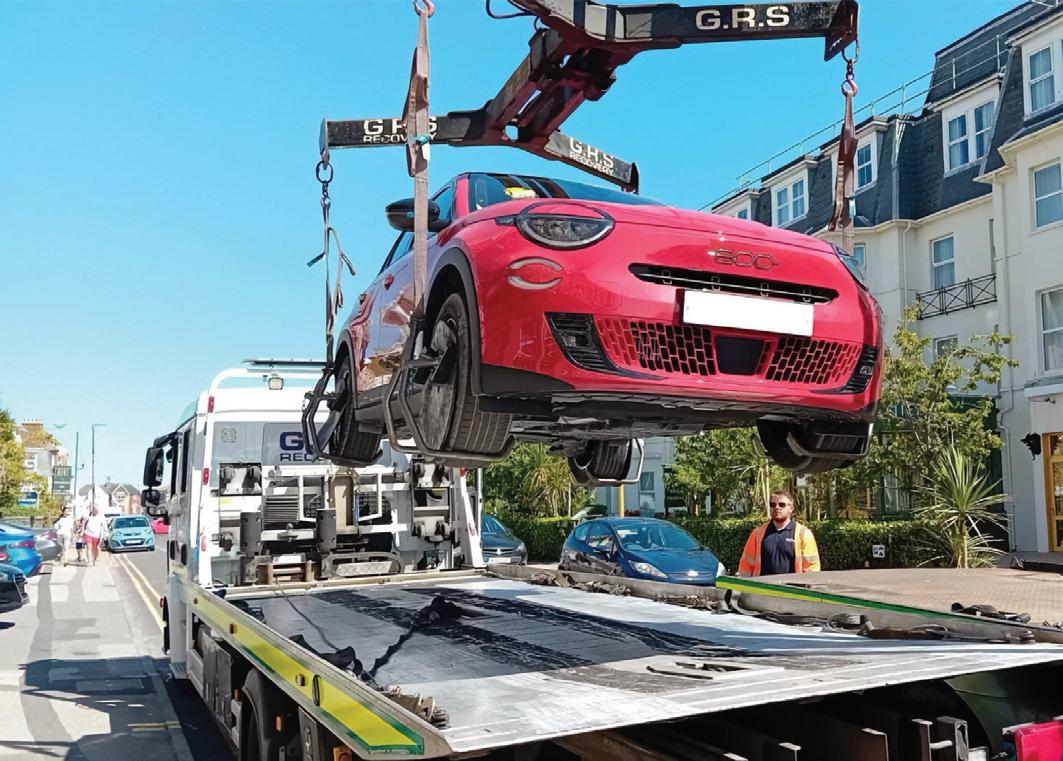
“Some of the parking we’ve seen hasn’t just been inconsiderate and irresponsible – it’s been dangerous. Residents’ drives and access points have been blocked, and emergency vehicles have struggled to get through key routes: ultimately putting lives at risk.
“At the moment, if your car gets towed and you collect it the same day it will cost you £105; throughout the period of this trial it would cost £280 to be released the same day.
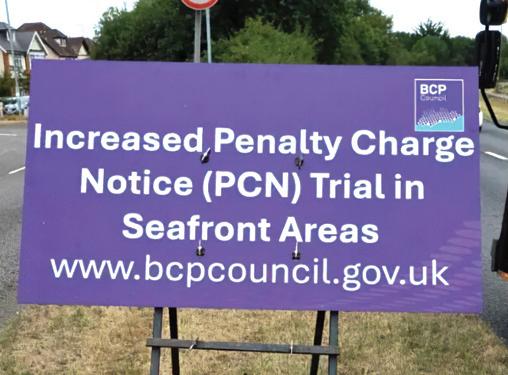
“For too long, illegal and dangerous parking along our seafront roads has put lives at risk, obstructed emergency and resident access, and undermined the safety and enjoyment of our coastal spaces. This is not just a matter of inconvenience – it’s a public safety issue we can no longer ignore.
“This trial is about seeing if tougher penalties will have an impact and stop people from parking irresponsibly along our seafront. Our goal is to make the area safer and easier to access for everyone who lives here and visits our beautiful area. It is also important that we get everyone’s feedback on the trial, so I urge everyone – residents, visitors and businesses – to fill in the short form on our website to let us know what you think.”
Pedicabs are to be regulated in London for the first time. The aim of bringing pedicabs into regulation is to make them safer by ensuring that they are driven, maintained and operated in a safe and professional manner.
Transport for London (TfL) has published the results of a consultation that shows overwhelming public support for regulation of the industry, to improve driver and safety standards.
The consultation received more than 7,500 responses which revealed:
• 75% of people who responded currently feel unsafe when using a pedicab in London
• 95% of respondents agreed that pedicab drivers should be required to pass UK criminal background checks, bringing them into line with taxi and private hire vehicle drivers
• 97% of respondents felt that pedicabs should have appropriate insurance in place to carry passengers
Penalty charge notice (PCN) fines are set by the government and currently stand at:
• £70 for higher tariff parking offences (reduced to £35 if paid within 14 days)
• £50 for lower tariff offences (reduced to £25 if paid within 14 days).
During the trial period, PCNs will be increased in the designated trial area to match London rates:
• £160 for higher tariff offences (reduced to £80 if paid within 14 days)
• £110 for lower tariff offences (reduced to £55 if paid within 14 days).
The fines for removals will also increase significantly during the trial. They currently stand at:
• £105 for release from Car Pound
• £12 for Storage Fee (per day)
• £50 for Disposal Fee.
During the trial, they will increase to match levels set for London:
• £280 for release from Car Pound
• £55 for Storage Fee (per day)
• £100 for Disposal Fee.
A ‘higher tariff’ is when motorists park somewhere that is not allowed, a ‘lower tariff’ is an infraction at a legal place of parking (i.e. staying too long, parking outside of the bays).
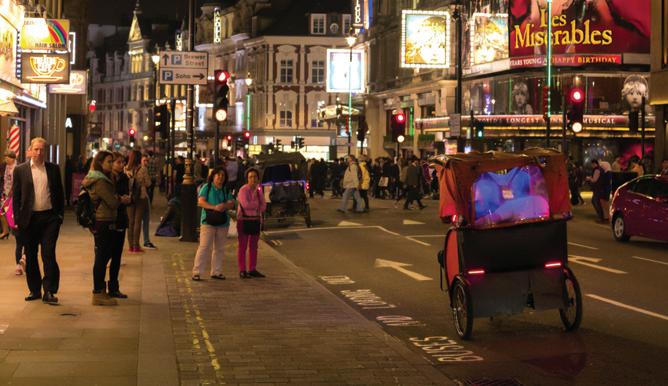
pedicab industry and Londoners are able to have their say on TfL’s specific proposals for regulations. It covers safety regulations and a potential fare structure, this is with a view to regulations coming into force in early 2026.
TfL hopes the ongoing engagement will ensure that future regulation is fair, proportionate and effective in addressing concerns raised while supporting a professional pedicab industry in London.

• 96% of respondents felt that music and other audio from pedicabs should be controlled. More than 2,400 comments in response to the consultation were about music in the vehicles
• 85% of respondents felt that pedicab fares are too expensive.
The consultation responses are now being used to develop detailed policy proposals for pedicabs in London which will be subject to a further consultation later this year. This further level of consultation was deemed necessary to ensure that the
Will Norman, London’s walking and cycling commissioner, said: “Pedicabs should be a fun and sustainable way to explore what our city has to offer, but without regulation some drivers are behaving unsafely or anti-socially and charging extortionate prices.
“The Mayor and I have always been clear that regulation is needed to ensure pedicabs can operate safely in London, and this report shows that Londoners agree. We’re looking forward to pressing on with next steps and further consultation, with a view to introducing regulation next year, as we build a fairer and safer London for everyone.”

The parking industry in the UK is undergoing a revolution, and WPS is at the forefront. Say goodbye to the frustration of multiple parking app sign-ups – the National Parking Platform (NPP) streamlines payments for a seamless experience.
Are you ready to embrace the future? WPS is your trusted partner for a smooth transition. Our future-proof hardware is fully NPP compatible, ensuring a hassle-free upgrade whenever you’re ready.
Upgrade your parking experience today. Contact WPS to discuss your NPP integration.



ITS UK calls on government to reconsider decision
The Department for Transport (DfT) will not be producing guidance for local authorities on the implementation of noise cameras, which enable the identification of loud vehicles driven antisocially through residential neighbourhoods.
Noise cameras are installations that combine automatic number plate recognition (ANPR) and acoustic measurement technologies. They have been installed by a number of local authorities and were the subject of government-backed studies.
In its ‘Plan for Drivers’, the previous Conservative government said it would “issue guidance to local authorities setting out minimum requirements and best practice for the use of noise cameras, sharing the findings of recent trials of this equipment”.
In response to a Written Parliamentary Question posed by Conservative MP Damian Hinds, the Labour government stated that it does not currently have plans to produce further guidance on noise cameras.
The update regarding the guidance on noise cameras was provided in Parliamentary Question UIN 57223, tabled on 4 June 2025. On 12 June future of roads

ITS UK A noise camera set-up
2. The government should publish guidance for local authorities on rolling out noise cameras using Public Spaces Protection Orders (PSPOs).
3. Government should work with industry to support public awareness campaigns that promote the positive role noise cameras can play in reducing noise pollution.
minister Lilian Greenwood wrote: “The Department for Transport does not currently have plans to produce further guidance on noise cameras but is keeping up to date with any advancements in this technology.
“It is ultimately for local authorities and the police to consider what the most appropriate enforcement routes may be for addressing issues with excessive vehicle noise within their area. The use of noise camera technology has already been taken forward by some local authorities.”
ITS UK, an organisation that represents the intelligent transport sector, has been an advocate of noise cameras. ITS UK chief executive Max Sugarman, said: “It’s disappointing to see government no longer has plans to produce guidance for noise cameras. Noise is proven to adversely affect public health, and tackling it – through technology like noise
cameras – has shown to be popular. In fact, as ITS UK’s Noise Camera: Where Next? report shows, 69% of the public support measures to enforce noise limits on road vehicles.
“Many local authorities will be interested in implementing this technology, but many will be unsure about how to do so, particularly around the use of Public Spaces Protection Orders (PSPOs). Guidance for the sector can ensure local authorities can continue to roll out this technology, supporting a quieter road network for the public.”
ITS UK’s report Noise Cameras: Where Next? was published in January 2025. It provided an overview of the noise camera market in the UK, and set out three recommendations on how government could support the technology: 1. Establish a government-led Noise Group comprised of key industry stakeholders.
A coalition of UK transport solution providers and data consumers has sent an open letter to minister for the future of roads Lilian Greenwood urging the government to set a firm deadline for the nationwide implementation of Digital Traffic Regulation Orders (D-TROs).
The letter is led by Dan Hubert, chief executive of AppyWay and co-signed by organisations including Intelligent Transport Systems UK (ITS UK), TRL and the RAC Foundation.
The coalition states that D-TROs are the fundamental foundational layer required for connected and autonomous vehicles (CAVs) to operate safely and legally on UK roads, as laid out in the Autonomous Vehicles Act.
Without a digital, machine-readable format for traffic regulations, which govern everything from speed limits to parking restrictions, autonomous vehicles will be unable to interpret and comply with the rules of the road. The coalition argues that while the industry is ready to deliver the necessary technology, progress is stalled as
local authorities await a clear mandate from the Department for Transport.
The signatories warn that a current ambiguity jeopardises the UK’s leadership position in the CAV sector.
“What was initially expected in July 2025, then suggested for October, is now drifting toward 2026 with no confirmed date in sight,” said Dan Hubert. “This ambiguity is costing UK plc millions a day in lost productivity. If the UK is to hit the ground running and lead in CAV innovation, the department must urgently set and publish a firm D-TRO adoption deadline. The industry is aligned and ready to deliver, but cannot do so in a vacuum of certainty.”
The letter sets out the immediate and wide-ranging benefits of implementing D-TROs beyond autonomous vehicles, including:
• Accelerating strategic initiatives: Speeding up the roll-out of on-street EV chargepoints and shared mobility services, and improving kerbside accessibility for 2.35 million Blue Badge holders.
• Improving traffic management:
Alongside the report, independent polling commissioned by ITS UK and carried out by Opinium revealed:
• There is strong support for measures to make it easier to enforce against excessively noisy vehicles, with 69% in support, and 16% opposing.
• Awareness of noise camera technology is low, with two thirds of the public (67%) having never heard of them; 17% have heard but don’t know any details, and a tenth know at least a bit about noise cameras (10%). Among those with access to a vehicle, awareness remains low at 28%.
• However, when noise cameras are explained to respondents, support for their further roll-out is high with 62% in support, and 20% opposing.
• Half think public awareness of laws around excessively noisy vehicles and their enforcement is too low (50%) with only a fifth thinking it’s ‘about right’ (20%).
Enabling real-time, data-driven responses to traffic conditions to reduce congestion and emissions.
• Increasing public value: Reducing the administrative burden on local authorities and maximising the return on investment for other government transport initiatives like the National Parking Platform (NPP).
The coalition argues that by prioritising the digital infrastructure, the UK can gain a strategic advantage over other nations that are focussed primarily on vehicle technology.
It states:”This is a strategic moment for UK transport. While other countries focus on vehicles, the UK can lead by embedding the infrastructure that makes autonomy safe, legal, and scalable. We urge you to confirm and publish a D-TRO deadline as a matter of priority. This single step will unlock nationwide momentum and ensure your department’s CAV ambitions start with the digital infrastructure they require.”
The signatories includes AppyWay, Arrive, Disabled Motoring UK, Grid Smarter Cities, ITS UK, Motability Operations, RAC Foundation, Symology and TRL.
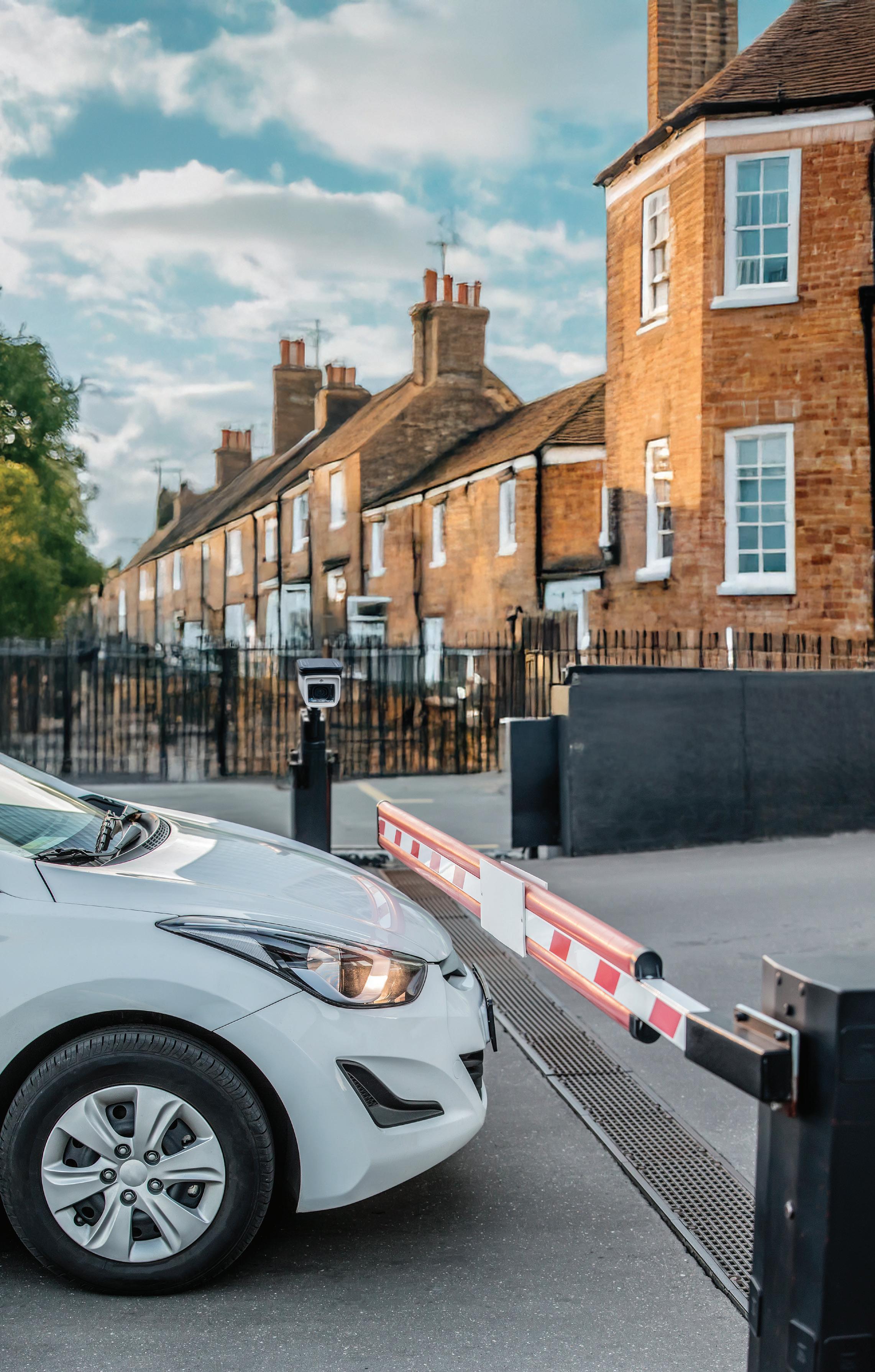

Pupils will audit travel to school using new child-friendly app
Primary school children can now become real-life school run superheroes as Active Travel England and the Department for Transport unveil a junior active travel inspectors scheme.
Pupils will be able shape their own travel to school, helping all children access safer, greener and more accessible walking and cycling routes to school.
Around 40% of primary school children and 25% of secondary school pupils are currently driven to school and school drop-offs account for around 25% of peak morning traffic in London –even more elsewhere around the country.
Transport secretary Heidi Alexander visited Hollybush Primary School in Hertford to mark the launch of the scheme.


She said: “Walking, scooting and cycling to work and school has many benefits, to the economy, to congestion, air quality and physical and mental health. We want to make sure that more children and families can take advantage.”
National active travel commissioner Chris Boardman also attended the launch. He said:

hoods, and give them the skills and support they need to work with councils to make improvements to local streets, which will encourage their classmates to walk, wheel, scoot or cycle to school. An active journey to school can unlock the health benefits for the whole family, and the wider community.”
Each participating school will recruit a team of junior active travel inspectors, who will work with teachers and parents to assess local walking and cycling routes around their schools. They will use this data to identify barriers to healthier journeys and suggest ideas to encourage more active and safer travel to school.
A collaboration between Active Travel England and Modeshift STARS, the junior active travel inspectors will then report on areas for improvement using a bespoke, child-friendly version of Active Travel England’s inspection checklist.

and provide a brief description to help support teams recognise and assist the individual more effectively.
The StreetLink platform first went live in September 2023 and processed over 52,000 alerts and successfully aided more than 6,000 individuals across England and Wales in the first eight months alone.

APCOA environmental enforcement officers (EEOs) in west London are helping rough sleepers to connect with local support by using an app installed on their handheld devices. With EEOs regularly monitoring the streets and parks of Ealing and Hounslow as part of their daily duties, they are well placed to quickly notice any individuals who may need support.
The app creates a direct link between officers on the ground and the StreetLink platform, which uses alerts from members of the public to connect rough sleepers with local support services.
The officers will connect with StreetLink to pinpoint the exact location where a person has been seen sleeping rough
Kim Challis, APCOA regional managing director UK&I, said: “Adding social value to the communities in which we work is an important part of our ethos as a business and we are delighted to support such an impactful initiative.”
Cllr Louise Brett, cabinet member for safe and genuinely affordable homes at Ealing Council said: “Helping those who are sleeping rough remains a top priority for Ealing Council, and we’re committed to doing everything we can to support them.”
Cllr Sue Sampson, cabinet member for housing and homelessness at Hounslow Council said: “Through our collaboration with APCOA and the use of the StreetLink platform, we are improving how quickly we can reach vulnerable people and ensure they get the care and support they need to move forward.”


A car park on the Isle of Guernsey could become the home for two emergency housing sleeping pods.
Local homeless charity Caritas has submitted a planning application for the installation of the self-contained one-bed pods in the Vale Parish car park.
The pods have been developed by the charity Amazing Grace Spaces, The pods are designed to be discreet and operate fully off-grid. Each unit includes a secure sleeping space, a toilet, solar power, and battery storage.
Caritas said it would provide support to help those using the pods to find longer-term accommodation and access other essential services.
Caritas Guernsey chair Graham Merfield said: “This is really intended as just a short-term stop-gap, intended to provide accommodation
for people who would the move onto more permanent accommodation. This is really designed for use for three to seven nights.
“We do know that people have stayed longer in them because they have had nowhere else to go, but our intention is to move people on as soon as possible.”
The Vale Parish said: “The constables and douzaine of the Vale believe this initiative is a valuable and meaningful response to homelessness in Guernsey. We fully support the project and are pleased that our grounds can be used to help provide immediate, practical support to those in need.”
Caritas is to meet with the States of Guernsey’s new housing committee in the coming weeks to discuss the further uses of modular housing.


When parking makes it on to the airwaves it is usually in news reports or documentaries that focus on complaints about unfair fines or revelations about the antics of ‘rogue’ operators. It was, thus, refreshing to hear an edition of the BBC’s business programme
The Bottom Line which took the time to explore the provision of public parking as a business.
The programme’s host Evan Davis was joined in the studio by three leading lights from the parking sector:
• Adam Bidder, managing director, Q-Park UK and Ireland
• Ashley Bijster, group manager, Modaxo
• Anthony Eskinazi, founder and president, JustPark.
Opening the discussion, Davis said: “It’s fascinating to go behind the scenes and see how various industries work, where they
make their money, where they spend their money, what goes well for them, what goes wrong for them. It is even more fascinating when it is an industry of which most of us are customers. The industry we are discussing is one that raises strong feelings of annoyance and frustration – car parking,
“Now, I think some would say it’s not a business – it’s a scandal how much you pay in fees and in fines! But parking has been changing pretty fast as an industry. You might think it’s just about painting lines on the ground between which cars can sit, but it’s actually getting to be high-tech.
“There are record numbers of cars on the road, 42 million in the UK, and there are worries that our parking infrastructure is stagnating. The number of spaces could be falling. So let’s look at the provision of commercial off-street car parking.”
The quartet spent the next half-hour talking about themes seldom covered seriously in the print or broadcast media: the cost of building and managing car parks; the changing nature of parking in town centres; regulation of the parking sector; and trends in cashless payment. And, yes, the National Parking Platform got a mention.






The cost of parking
Davis asked why should people pay for parking? As the operator of a portfolio of car parks, Q-Park’s Adam Bidder explained: “The simple answer is that it is actually very expensive operating and building a car park. If you’re going to build 400 spaces, that would cost about £10m to build.”
Bidder set out why the perception that parking operators are coining it in is wrong. “People don’t realise what they’re paying for,” he said. “If they’re paying £5 for two hours to park, or an hour to park, depending which city you’re in, a pound of that goes on VAT, a pound of that goes on business rates. So, the typical profit for a car park would actually be around 10 to 15%. So, if you’re paying £5, the actual money left for the car parking operator will only be somewhere between 50p and 70p once they’ve paid all the taxes and so on. And that’s if it’s quite busy.”
The panel discussed about whether car parks can stay profitable in the face of changing travel patterns post-pandemic, and a growth in restrictions placed on the use of cars in towns and cities. Bidder suggested: “A lot of the industry is not profitable, and it is a lot less profitable since COVID. There’s been about a 6% reduction in driver footfall in city centres since COVID.”
Looking through the eyes of the driver
Davis asked if the fact that some car parks are free makes it harder to sell parking in other places.
Modaxo’s Ashley Bijster said a key challenge when running parking as a business is many drivers have a problem placing a value on the parking they use. Drawing on her experience as a driver as well as a business person, Bijster observed: “Where I live the local authority just introduced parking charges into essentially what was a market town, and there is absolute uproar within the community. It’s £3.50 a day. Everybody’s happy to go to Costa Coffee or Coffee #1 and pay £3.90 for a coffee, but they don’t want to pay the parking charge. There’s a generational thing as well. My mother would just expect everything to be free, and paying for parking it’s just a concept she doesn’t understand.”
Perception also comes into play when motorists react to being penalised when they breach parking rules. “I went into a car park and it was completely empty,” recounted Bijster. “I had to pop into a shop to get some food because I was working away, and my wheel was just over the line, but it was a ANPR site, so I got the ticket with a photo of the car with a wheel just over the line. I was really, really angry with myself, but also that I’ve been issued with a ticket. But then I understand it. I was in a different car park last week and some really selfish people had parked with wheels over lines so you couldn’t get parked. So I just got over myself!”
Delivering a quality experience
Evan Davis said quality is an important issue on most industries and wanted to know how this played out in parking. “There’s price and there’s quality and there’s value,” he said. “Let’s admit it – a lot of car parks are not very nice!”
Davis invited JustPark’s Anthony Eskinazi to explain how his online service was differentiated from traditional parking companies. “JustPark is a decentralised parking operator, so we may have 100 spaces in a small area, but they’ll be dotted around 50 different locations. For us it’s helping the driver find the best space for them. As we’re a purely digital service, every time someone books and parks on JustPark, we send them an email and ask them to leave a review, just like you would on any e-commerce site. We’ve had millions of reviews left about all of our different car parks, driveways, etcetera. The vast majority are 5-star. But when we see a 1-star, 2-star, 3-star, we find out what has been happening. We package up that feedback and the account manager for the different operators share it directly with them. A lot of time we’re finding out before the operators know about it.
“So, if you go on to the JustPark website, you will find most of our locations are rated four or five stars from thousands of reviews. That’s because the 1-star, 2-star and 3-star sites have actually been removed. If someone is having that kind of negative experience, they’re less likely to come back. They’re less likely to tell their friends. It’s not in our interest to even have these sites listed on our website.”
Eskinazi offered a Utopian vision of world where fines and penalties are a rarity. “Car parks can offer an autopay functionality, making it easy for drivers to pay what is due and comply with rules. There should be autopay everywhere. The majority of drivers on UK roads now have one of the main parking apps on their phone and all of these apps offer an autopay service. Nothing stops every parking operator from enabling autopay. There are challenges because a lot of the enforcement companies, and some operators, rely on tickets as part of their business model.”
Making parking user-friendly
When it comes to improving customer service there are things that the parking sector can do to make the customer journey easier, said Modaxo’s Ashley Bijster. She addressed how the proliferation of phone apps made paying confusing.
“In London, you’ve probably got four or five different apps dependent on the borough that you’re in,” she said. “It becomes problematic because you rock up at a car park in an area that you’ve not been to before, and you’re having to download a new app and then register, and it’s such an annoyance. But that’s changing, because you’ve got the National Parking Platform, which is looking at bringing all of those apps together into one platform.”
JustPark’s Anthony Eskinazi said: “I’m a director of National Parking Platform and quite involved in the set-up of it. So I’m a big fan of it. I think drivers should be able to choose their favourite app, rather than just because this one app won a public procurement process four or five years ago. I think there will be savings for local government. They’re not going to have to run these expensive processes that cost each authority £10-20,000 pounds every four years. We’re talking about tens of millions of pounds of wastage now.
“The NPP’s going to be rolled out slowly. We’ve already got 10 local authorities on it. There’s probably going to be another five or six joining this year. But next year, I think we’re going to see a real acceleration of it. Then, whatever your favourite app is, you’ll be able to use that wherever you go in the country, from an on street perspective. I see the private operators, over a period of time, also adopting the National Parking Platform. Maybe five years from now, you will be able to use your favourite parking app wherever you go to park in the UK.”
Evan Davis addressed the changing nature of parking, with Davis asking about how the operators are now generating income streams from a wider range of services.
“I’m in the business of running mobility hubs, not car parks,” said Q-Park’s Adam Bidder. “If we provide a good quality service, we’re more likely to get a car hire company, more likely to get an e-bike company. We have EV chargers now in 80% of our car parks in the UK and Ireland. So if we can offer other services, such as car cleaning services, the better the quality of the environment. Amazon storage lockers are something you now see a lot in car parks. These are another way of monetising underutilised space. We generate millions of pounds a year – well over £5m each year – from those alternative users.”
Davis suggested that in some cases a better return could be generated if more car parks were re-purposed into housing or other uses. Bidder replied: “In 2020 I said, I don’t think there’ll be any more city centre car parks built in my lifetime, if you like. So far, I’m right on that. If you actually look at the number of city centre multi-storeys, there are odd ones for specific offices or residences, but there has been a reduction. We operate 20 car parks in central London. Five of those have gone in the last five years. Another five will go in the next five to 10. There will be a number of mixed-use developments and a reduction in provision.”
Responding to the idea that a reduction of parking capacity in city centres could mean motorists will face even more competition when looking for the remaining bays, Davis said: “This is big news because there will be fewer spaces and higher prices!”
The Bottom Line is a produced by the BBC in partnership with The Open University. As well as being a podcast, it is broadcast on BBC Radio 4 and available via BBC Sounds.
Parking operator reports 35% drop in carbon emissions
European parking operator APCOA has managed to reduced its carbon footprint by over a third.
The company’s 2024 environmental, social and governance (ESG) report shows its carbon footprint was cut by 14,638 tCO2e, a 35% drop since 2023.
The company is making a transition to greener transport solutions. It grew its electric fleet from 26% EV and hybrid in 2023 to 35% in 2024.
An evolving EV charging infrastructure is a key pillar of the company’s environmental strategy. At the end of 2024, the company managed 4,654 EV chargepoints – a 12% increase since 2023.
Nicola Veratelli, chief executive officer of APCOA, said: “At APCOA, we see sustainability as an opportunity to lead, innovate, and make a meaningful difference. Our ESG strategy is built around ambitious goals to be achieved by 2030, setting us
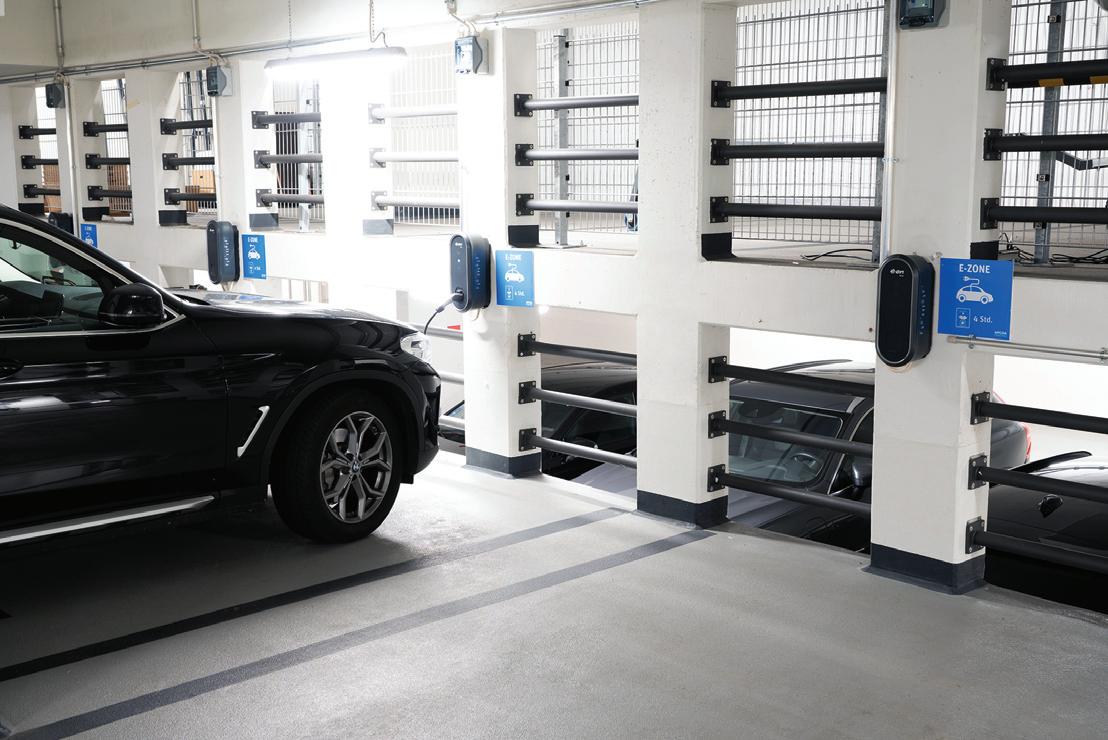

firmly on the path to net zero by 2050. 2024 was a breakthrough year for APCOA’s ESG journey. We turned strategy into
action, and saw meaningful results.”
In addition to environmental sustainability, the company sees
European parking operator has appointed Joerg Ulrich as chief growth officer.
He will be responsible for leveraging the existing sales capabilities, the portfolio management and the analytical tools to further strengthen the company’s market position and to unlock

Andrea Jones has been appointed as the new managing director of Project Centre, which is part of Marston Holdings.
Jones spent six years at NSL, most recently as strategic operations director. Before which she was at Camden Council for nine years in a range of roles including operations manager.
Jones brings over 20 years of experience delivering public sector solutions across parking, clean air and
technology. She has a track record in data-led, policydriven projects such as Low Emission Zones and School Streets.
Keith Hanshaw, former managing director of Project Centre and now group managing director at Marston Holdings, said: “Andrea is a great choice for the role. As well as being an inspiring leader, she will guide Project Centre into its next phase by deepening client relationships and delivering more integrated, tailored solutions across consultancy, frontline services, and technology.
“Her leadership will help us create clear, effective strategies and innovative delivery models that drive sustainable, realworld results.”
Andrea Jones said: “It’s been a fantastic start at Project Centre. I’ve seen so much talent and enthusiasm across the team, and I’m really looking forward to continuing to work closely with our clients to build on our strengths and deliver exceptional outcomes.”
people at the core of its success. Since joining the UN Global Compact in 2021, the company put robust social responsibility measures in place to empower its teams and support local communities.
In 2024, every APCOA country took ownership of their social impact, rolling out locally driven initiatives that support employees, champion diversity, and give back to causes that matter.
Kim Challis, managing director UK & Ireland and group director ESG, said: “We’re proud of what we’ve achieved, but even more excited about what’s next. Across APCOA, our people are embracing the challenge, sharing ideas, and pushing boundaries to make our business smarter, greener, and more inclusive.”
new revenue streams.
Ulrich has been with APCOA since 2014, holding several senior leadership positions, most recently serving as group director strategic sales and alliances.
He takes over from Frank van der Sant, who has left the organisation in May.
In 2025, APCOA UK was awarded its first Bronze EcoVadis rating. It signifies that the company has demonstrated a commitment to sustainability and has implemented practices across environmental, labour, ethics, and procurement areas. It places the company in the top 35% of those assessed by EcoVadis in the past year.
Disabled Motoring UK (DMUK) has named two leading parking professionals, Anjna Patel MBE and Tom Gallagher, as trustees. The charity works with government and businesses across the UK to improve parking, refuelling, and access provision for disabled people, so that they can access the goods and services that they need.
Anjna Patel MBE was parking lead at Sandwell Council and is a former president and chair of the British Parking Association.
Tom Gallagher is head of parking at London’s Ealing


Council and a driving force behind the annual Blue Badge Day of Action.
Other appointments to the board include David Fowler and Margaret Oldham OBE. Graham Footer, chief executive of DMUK, said: “Their passion, experience and shared commitment to making transport more accessible is truly encouraging. With our new trustees on board, we’re more energised than ever to champion the rights of disabled motorists, push for better policies and create meaningful, lasting change.”

Parking payment group unveils new leadership structure for Britain
PayByPhone has promoted Rebecca Maisey to a newly created role of UK commercial director. Maisey. She been with PayByPhone for over 14 years, most recently as senior client director.
Maisey assumes full responsibility for all PayByPhone’s commercial activities in the UK. Her promotion coincides with Adam Dolphin stepping down from his role as UK managing director and the introduction of a new management structure.
Maisey will report directly to PayByPhone president and chief executive officer, Jonny Combe. She also joins the senior commercial leadership team.
Combe said: “Rebecca is a consummate professional who is highly-respected not only by her peers in the company but also by the industry as a whole – she won the inaugural

Inspirational Woman in Parking award at the BPA’s People in Parking Awards in 2022.
“Her strong, long-standing client relationships and natural leadership style make Rebecca ideally placed to shape the next phase of our commercial strategy in the UK, leading the unification of all UK commercial functions, driving growth, innovation and customer focus.”
Rebecca Maisey said: “I am delighted to take on the leadership of the UK’s commercial business at a time when the UK parking landscape is evolving, particularly with the introduction of the National Parking Platform. I am committed to ensuring PayByPhone remains the app of choice. In addition, thanks to our new features and strategic partnerships

announced this year, the UK will build on that momentum to realise even greater success.”
Adam Dolphin, who has been PayByPhone UK managing director since 2023, steps down from his role, effective immediately. Dolphin will support the UK business as a senior advisor, with a particular emphasis on new business development, until the end of the year.
Combe said: “I would like to thank Adam for everything he has done for the business. He remains a highly valued and respected member of our team and he has made a lasting impact, particularly with our clients, where his relationships and expertise have been key to many of our successes.
“We will not be replacing the UK managing director role. Instead, this new UK structure will suit both the current shape and future direction of our UK operations better.”
Anthony Cashel, PayByPhone chief operating officer, will assume the UK statutory and legal responsibilities.
We currently supply and have vacancies around the UK for Permanent and Temporary positions:
• Civil Enforcement Officers
• Environmental Enforcement Officers
• Parking Back Office (Appeals/Notice Processing/Correspondence)
• Parking Change Management
• Interim Parking Managers
• Car Park Attendants/Marshalls/Stewarding
• Parking Supervisors (Both Enforcement and Back Office)
• Parking Management (Both Enforcement and Back Office)
• Heads of Parking/Directors

• Parking Technologies (Business Development and Project Managers/ Field Service Engineers/General Managers)
• Off Street Parking (Business Development, Contract Managers and Regional Managers)
• CCTV Operators – SIA and BTEC qualified
Looking for staff or need employment? Please contact our experienced team on:
Tel: 0203 668 5680
Email: parking@unity-recruitment.co.uk
Web: www.unity-recruitment.co.uk












The British Parking Awards has attracted a record number of entries
The British Parking Awards recognise excellence and achievement in a sector that provides what is an essential public service.
The competition showcases ground-breaking technologies, effective communication, community engagement, and excellent car park structures.
The competition also reflects the way in which the sector is evolving, as seen in the EVolution Award, which is dedicated to electric vehicle infrastructure. This year we will also focus on the innovative aspects of parking, both national and global, in the form of the Future of Parking Award and the International Award.
Central to the awards are people working in parking. The competition will honour both inspiring individuals and dedicated teams. We will also recognise the important work being done to enhance the mental and physical health experience of those working within the sector with the Wellbeing Award.
This year we received a record-breaking 180-plus entries from across the public and private sectors, often with local authorities and their contractors working closely together in partnership.
Our largest ever jury of experts is assessing, comparing and debating the entries to select the shortlisted finalists who will proceed to the final, which is held at the Royal Lancaster London on 12 September.

(Re)introducing the award’s hosts
Paul Sinha and Roger Tilling will host the British Parking Awards at the Royal Lancaster London. Last year the pair delivered one of the awards’ best ever ceremonies.
Paul is a brilliant stand-up comedian and quizzer, best known for being ‘The Sinnerman’ on ITV’s hit gameshow The Chase. He has just completed a well-received series of standup shows at the Edinburgh Fringe Festival.
Roger is the ‘Voice of God’ for many top TV programmes, including The Royal Variety Performance and BBC2’s University Challenge.
Headline sponsor
Category sponsors




Andrew Pester

Community, engagement and professional development were among the key themes discussed at the British Parking Association President’s Reception, held at the House of Commons on 9 July. The BPA’s chief executive Andrew Pester looked back at what the association had achieved over the past year, and ahead to the what it plans for the coming one.
“This year we proudly celebrate 55 years as the leading association for the parking sector,” he said. “As a not-for-profit association, our strength comes from our diverse and inclusive membership community. Together we drive our vision for parking and travel experiences that exceed expectations.”
Over the past year, the BPA has achieved its organisational objectives, reported Pester. “Professional development has been a real success story,” he said. “Through BPA Advance and our learning programmes in parking enforcement and notice processing we are raising the bar once again. These programmes are assured by City & Guilds, a globally recognised benchmark for high-quality training. That recognition says a lot, not just about the content, but about our commitment to driving professional development. And their impact?
Hundreds of learners have already benefited; with more learning providers coming on board. Watch this space over the next year.”
Political engagement has been another area where the BPA has been active, said Pester. “Our influence continues to grow year on year, and this is no accident. It reflects the relevance, credibility and leadership of the BPA. Highlights include future of roads minister Lillian Greenwood choosing Parkex 2025 as the stage on which to announce the launch of the National Parking Platform (NPP), which has the BPA’s APDS standards at its core.
“The UK government has also seconded two of our talented staff team colleagues to the Department for Transport, which is a strong vote of confidence.”
When it comes to influencing government policy, the association seeks to make the parking sector’s voice heard, said Pester. “We are recognised as a trusted authority at political roundtables, including those most recently focussed on the Private Parking (Code of Practice)
Act. The feedback from these roundtables has been consistent –praising the BPA’s professionalism, genuine commitment to raising standards – including the independence of Parking on Private Land Appeals (POPLA) – and the quality of accreditations we manage.”
Pester set out the importance of networking and meetings in nurturing the BPA as a diverse and growing community. “Our events programme continues to go from strength to strength, with flagship and world class events such as Parkex and the BPA Live roadshow. These events help keep our members informed, connected, and ahead of the curve on sector trends. Beyond that, we’ve hosted over 100 meetings this year. These events are spaces for members to collaborate, share ideas, and learn from each other.”
Pester then welcomed this year’s BPA president Mike Marrs, vice president Steven Foster and new chair of the board Richard Walker. He also, sort of, bade farewell to BPA director Kelvin Reynolds. www.britishparking.co.uk




The president stood behind a lectern in the Houses of Parliament and said he wants to make parking great again. Yes, parking! Well, Mike Marrs, that is, president of the British Parking Association. The chief executive of APN Group delivered a witty and good natured inauguration speech on his first day of his second term of office.
“For those who didn’t know, I’ve worn the chain of office before,” he told those gathered at the BPA President’s Reception. “When I previously held the presidency the chain was heavy then, and it is heavy now. The first time I had big boots to fill. Those of the titan that was and remains, Mr John McArdle.
“Now, my immediate predecessor, Richard Walker, has shown just what it takes to be a true ambassador for our association. In my humble opinion, he absolutely nailed it. Richard’s was pretty much a flawless presidency. Truly a hard act to follow. He travelled to almost every BPA event, including those in Perth, Dublin, Coventry, Leeds, Bristol, Brighton, Reading and Peterborough, and some of those places twice.
“Always impeccably dressed, and with a smile on his face, Richard truly has represented the broad church that is the BPA, representing local authorities, enforcement agents, private parking operators and our colleagues in technology.”
Spelling out his mission to ‘make parking again’, Marr mused: “Many people have said to me, how can we make parking great again? I say, it’s already great, isn’t it? Well, one thing that maybe could be improved is the way the parking sector, as we know, is full of acronyms – BPA, NPED, NPP, SPS, APN and UKPC to mention a few. So, I actually had some hats made for this event. I jest you not!”
Marrs then turned to the event’s host, Bayo Alaba, the Labour MP for Southend East & Rochford, who he knows well.
“I called Bayo’s PA and asked her: ‘How well do you know Bayo?’ To which she replied: ‘Where are you going with this?’
“I said: ’Well, I was thinking of getting some hats made up.’
“I was quickly told: ‘Bayo won’t be wearing any hats.’
“So that was the end of that!”
Bayo Alaba MP spoke at the event, hatless.


After over two decades of service to the British Parking Association, Kelvin Reynolds will be retiring from his role as chief technical services officer. However, he will continue to work for the BPA in a consultancy role.
Reynolds has spent most of his 55-year career in the UK’s traffic management and parking sector. He served for almost decade as an elected member of the BPA Council while the past two decades have been spent as a member the BPA staff team.
Reynolds was honoured with the Lifetime Achievement Award in 2016 at the British Parking Awards for his significant contributions to the parking profession. Among his achievements are:
• Creating Park Mark and the Safer Parking Scheme in partnership with Police Crime Prevention Initiatives, a UK-wide initiative designed to reduce crime and the fear of crime in parking facilities.
• Launching the first Approved Operators Scheme (AOS) for parking on private land. This initiative, together with its code of practice, introduced standards-setting and auditing of enforcement activities in privately owned car parks.
• Devising Project RECiPE, (Realising Excellence in Civil Parking Enforcement) and supporting local authorities in their transition to civil parking enforcement under the Traffic Management Act 2004.
“Kelvin’s legacy will continue to shape the UK parking sector for years to come,” said BPA chief executive Andrew Pester. “The good news is that Kelvin has graciously agreed to step into a new role of executive consultant, enabling the BPA staff team and members to tap into his extensive knowledge and ensure continuity in our ongoing governance activities.”




Cornwall Council’s parking enforcement manager Debbie Brock and group leader Sarah-Jane Brown

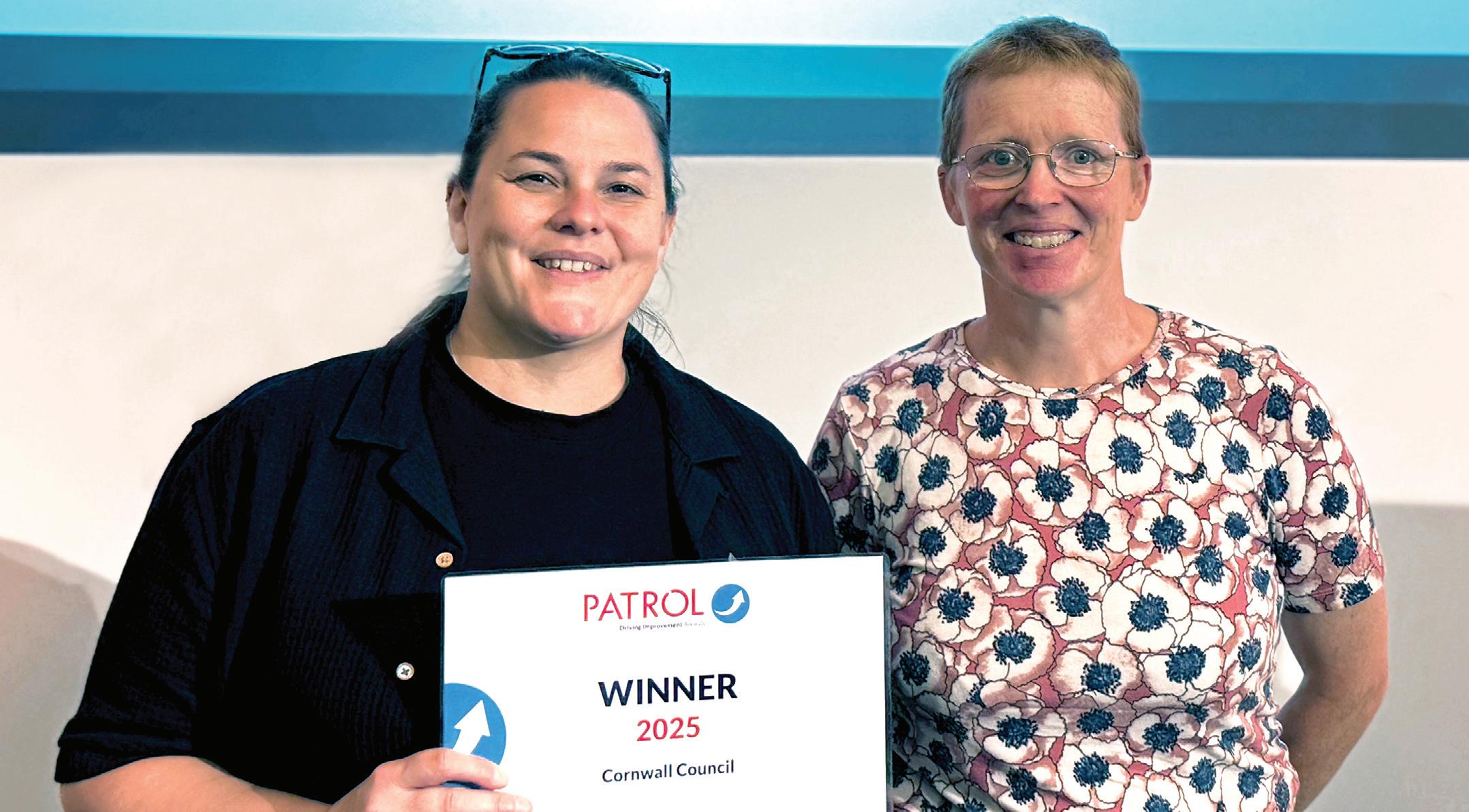

Cornwall Council wins 2025-26 PATROL Driving Improvement Awards
An idea for a public engagement campaign focussed on the issue of Blue Badge abuse and misuse proposed by Cornwall Council was named winner of the 2025-26
PATROL Driving Improvement Awards. The council’s winning entry, ‘Whose badge is it?’, is a campaign combining public engagement with internal enforcement training, including the production of an animated film and new materials to aid prosecutions.
The campaign proposal will be realised with funding from PATROL, which stands for Parking and Traffic Regulations Outside London.
The Driving Improvement Awards were presented at a ceremony held in London on 15 July. The annual competition gives PATROL’s member authorities the chance to submit a bid for funding to develop a public awareness campaign or activity, with bids encouraged around a specific theme each year, based on current or pressing events, issues and trends in the industry. Last year the competition focussed on looking after the wellbeing of front line staff, and resulted in the ‘Beyond the Uniform’ campaign.
Blue Badge abuse and misuse was chosen as the theme for 2025-26 as an area of increasing concern for PATROL’s authority members. The issue was highlighted by prime minister Sir Keir Starmer in December last year, who committed the government to tackling the problem. Since 2016, a 1,000% increase in Blue Badge fraud and misuse has been reported, with some authorities estimating that over 20% of all Blue Badges are misused. Additionally, over 700,000 penalty charge notices have been issued by local authorities in all areas of the UK for contraventions relating to the misuse of disabled parking bays.
PATROL will be working with Cornwall on the development and launch of its campaign from August, with the council set to activate
and report back to the Joint Committee by July 2026. PATROL’s key aim in awarding funding through the Driving Improvement Awards is for a winning campaign to produce a model or materials that can subsequently be used by other councils moving forward.
Laura Padden, PATROL director, said: “Cornwall’s bid was well thought out and blended a multi-channel awareness campaign and suite of materials for enforcement training and prosecutions. PATROL felt the latter, particularly, would be of great benefit for use by other authorities following the campaign period. The dedicated officer secondment in such a high tourism destination and wide geographic, complex enforcement environment also has huge potential to drive learnings for the benefit of our wider authority cohort.”
finalists
Four authorities were finalists for the Driving Improvement Awards: Cornwall Council (Winner)
The campaign will be supported by engagement with disability groups and targeted enforcement days, with success measured through increases in public reporting, prosecution outcomes, feedback from genuine badge holders and engagement across social media channels. The council has proposed a dedicated officer secondment be focussed on Blue Badge abuse during the campaign period.
Gosport Borough Council
Proposed a community-led initiative focussed on both intentional and unintentional misuse of Blue Badges, the impact on disabled individuals and the responsibilities of badge holders themselves. This was to be supported by a mix of digital and offline activities, as well as spot-check enforcement.
Malvern Hills District Council
Proposed a campaign aimed at highlighting the correct use – and consequences of misuse – of Blue Badges, centred on an educational video developed in partnership with a charitable arts organisation, supported by further voluntary and community sector partnerships.
Worcester City Council
Proposed a short film illustrating the impact of misuse, supported by workshops, targeted advertising and collaboration with local disability groups. A new public reporting system was also to be introduced alongside joint enforcement days with local police.
PATROL, NEPP and Brighton & Hove City Council recreated a public engagement stand at the Driving Improvement Awards event


Cornwall’s victory follows a busy year for Brighton & Hove City Council and the North Essex Parking Partnership (NEPP). They were jointly awarded the 2024-25 PATROL Driving Improvement Award, which led to their ground-breaking campaign, ‘Beyond the Uniform’, aimed at tackling the issue of abuse towards civil enforcement officers and other staff.
The two authorities rolled out Beyond the Uniform from January to March. The campaign received significant engagement, including over a quarter of a million impressions across social media and digital channels, as well as national media interest. In North Essex, a 73% decrease in incidents of abuse was recorded in Harlow during the campaign activation period year-on-year with the same period, with a 60% decrease for the year in full.
As part of this year’s Driving Improvement Awards event, representatives from both councils took to the stage to share their campaign’s journey, with other attending authorities also able to engage directly with the campaign’s outreach materials through NEPP recreating one of its Beyond the Uniform community events within a branded gazebo. The gazebo was staffed by Patrick Duckworth (communications lead, PATROL), Jake England (interim head of NEPP), Sarah Baxter (democratic services and policy manager, PATROL) and Sarah Bussey (parking contracts manager, Brighton & Hove).
In the coming months, PATROL will be rolling out the creative assets produced for Beyond the Uniform campaign, whitelabelled, for all its authorities to take forward in their own areas and coordinating a wider awareness effort about staff abuse, the campaign and its outcomes.
Laura Padden said: “I’m proud to see the early impact of PATROL’s Driving Improvement Awards through the sponsorship and development of the Beyond the Uniform campaign in just its first year of operation. The fantastic results and engagement from Brighton and NEPP demonstrate the value of this Englandwide and Wales-wide programme to inspire and empower local authorities to deliver creative communications that drive change around the big issues in traffic management and enforcement.”
The PATROL (Parking and Traffic Regulations Outside London) Joint Committee comprises over 300 local authorities in England (outside London) and Wales. The principal function of the Joint Committee is to make provision for independent adjudication in respect of appeals against penalties issued for traffic contraventions by local authorities and charging authorities in England (outside London) and Wales. Adjudication is delivered through the Traffic Penalty Tribunal (TPT). TPT adjudicators are wholly independent lawyers appointed with the consent of the Lord Chancellor. www.patrol.gov.uk


Apublicity campaign designed to address violence and aggression towards its civil enforcement officers (CEOs) has delivered positive results, with a 73% reduction in reported incidents. In 2024 the North Essex Parking Partnership (NEPP) saw its highest ever number of incidents, with almost daily reports of incidents, including spitting, racial and homophobic slurs, sexual harassment, physical threats, and even being deliberately driven at, taking a physical, mental, and emotional toll on staff.
The ‘Beyond the Uniform’ campaign pilot took place in the town of Harlow, where NEPP staff were experiencing the highest levels of abuse. There has been a sharp 175% rise in reported verbal and physical assaults on staff over the past three years.
Often misunderstood, CEOs not only issue penalties for illegal parking but also ensure road safety for schoolchildren, facilitate emergency vehicle access, and maintain accessibility for disabled individuals, among other crucial responsibilities. Beyond the Uniform sought to foster respect and empathy for CEOs by highlighting their humanity. It urged the public to see beyond the uniform, recognising CEOs as individuals – parents, grandparents, and friends – who contribute positively to their communities.
The campaign was appreciated by front line staff. Tanya McGrath, a NEPP CEO, said: “The campaign has had a noticeable positive impact on staff. Personally, I’ve had members of the public approach me to say they’ve seen the campaign, and that it genuinely makes them reflect on our roles and on life more broadly. It’s encouraging to see it resonate so widely. We’ve also observed a reduction in incidents, which I believe is, in part, thanks to this initiative. It would be fantastic to see the campaign rolled out more widely, as it’s clearly having a very positive effect.”
The campaign featured a variety of digital and print marketing posted throughout Harlow, running alongside pop-up community engagement events at the Harvey shopping centre, where NEPP engaged with 375 members of the community.
Funding for the pilot campaign was awarded jointly last year to the NEPP and Brighton & Hove City Council by Parking and Traffic Regulations Outside London (PATROL) through its Driving Improvement Awards programme. The campaign will now be syndicated by PATROL to its wider 300 local authority membership.
Laura Padden, director of PATROL, said: “I’m proud to see the early impact of PATROL’s Driving Improvement Awards through the development of the Beyond the Uniform campaign. The fantastic results and engagement from NEPP demonstrate the value of this England-wide and Wales-wide programme to inspire and empower local authorities to deliver creative communications that drive change around the big issues in traffic management and enforcement.”
Whilst the pilot and its funded activity have ended, NEPP is keen to build on the positive work, momentum and progress made. Cllr Paul Honeywood, chair of the North Essex Parking Partnership, said: “We’re thrilled with the positive impact and response Beyond the Uniform has had. Achieving a 73% reduction in reported incidents is a remarkable result and clearly demonstrates that the campaign’s tone and approach have resonated strongly with the public. The campaign has been a huge success for NEPP as well as its staff, partners and the wider parking sector and we are excited for the next steps, both for us and PATROL.”
Prime minister signals desire to prevent falls from multi-storeys
The government is preparing to conduct a call for evidence on minimum edge barrier heights in car parks.
The prime minister has promised to review safety standards in multi-storey car parks after hearing about the death of a 15-year-old boy after he fell from the top of a multi-storey car park in Liverpool.
Sir Keir Starmer told Parliament he wanted to prevent future tragedies after Labour MP Peter Dowd urged the PM to support a Private Member’s Bill he has introduced that seeks to increase the minimum required height of guarding. The Multi-Storey Car Parks (Safety) Bill also proposes the introduction of 24-hour staffing of such car parks to improve safety.
During Prime Minister’s Questions, Dowd, MP for Bootle said: “Gabe Santer, a 15-yearold, fell to his death from a multi-storey car park in Liverpool in 2020. He’s one of the many dying in such tragic circumstances, including in my constituency.

“My Multi-Storey Car Parks (Safety) Bill seeks to prevent such deaths. Will the government look carefully at its content as part of a national suicide prevention strategy?”
The prime minister replied: “The answer is yes, we will look at the content of it, and I’m grateful to him for raising it. Across the House, we have all got tragic experience of suicide,

Plans to upgrade the area around Clifford’s Tower in York are being reviewed.
The Castle Gateway scheme covers the Eye of York area where the River Foss meets the River Ouse.
The revised designs are based on responses to a public consultation that took place last summer.
Plans to close Castle Car Park will be put before senior
and our thoughts are with Gabe’s family and with his friends.
“We will conduct a call for evidence on Part K of the building regulations about minimum guarding heights, so that necessary protections are in place to prevent future tragedies. We will also look at the contents of the Bill.”
Gabriel Santer, 15, fell from a multi-storey car park on
Hanover Street in Liverpool. Gabriel died on 3 October 2020 after spending time with his friends in the city centre.
An inquest the following year recorded an open verdict after a coroner heard there was no evidence available to confirm how Gabriel, who was alone at the time, came to fall from the building.
His father has been campaigning for new legislation that would see an increase in the minimum height of barriers on the top of car parks to 2.7 metres, compared to the current minimum of 1.1 metres.
Johnny Santer is confident the issue is being taken seriously by the government after meeting building safety minister Alex Norris MP earlier.
Santer told the BBC: “Here we are in 2025, and people in my own city are still dying preventable deaths from these falls, these tragedies from car parks that can be so easily prevented, by just applying the legislation we’re asking for. It really is that simple.”
Maria Eagle MP (now a defence minister) previously presented a version of the Bill calling for the creation of ‘Gabe’s Law’ in 2023.
councillors later in the year.
Design consultants BDP said they had focussed on accessibility, heritage and maintenance when drawing up the new plans.
The project, which has been amended in order to cut costs, now includes a new park, play areas and 30 Blue Badge parking bays instead of a paved event space.
Pete Kilbane, deputy leader
of the authority, said: “We are working to transform this area from a car park to a people park. Our proposals include new play areas for families, something people have been asking for more of in the city centre, and green open space for people to relax and take some time out.”
The revised Castle Gateway proposals are set to go before the council’s executive in September and a decision will be made separately on the planning application.
In January councillors were told the first phase of the scheme would cost an estimated £3.5m. They were advised that the cost of plans for the scheme approved in 2020 would now be close to £16m. The revisions make the scheme more affordable so that it could still be delivered.
A proposed multi-storey car park at St George’s Fields is no longer set to go ahead, though improvements to existing parking facilities are still being considered.
Pedestrians were injured by falling debris when a van crashed through the façade of a Leeds city centre car park. The van’s bonnet was left dangling over the street.
Emergency services were called to the NCP The Markets car park on New York Street on 30 July.
The van’s occupants were taken to hospital for precautionary checks, while three members of the public taken to hospital after being hit by falling rubble, according to West Yorkshire Police.
None of the injuries were lifethreatening, a force spokesperson said.
Damage to the building was being assessed by West Yorkshire Fire & Rescue and structural engineers, the spokesperson added.
New York Street was partially closed because of the incident.


Airport parking area and shuttle bus fleet given a new look
National Car Parks (NCP) is undertaking a series of major upgrades at its Manchester Flightpath site, located five minutes from Manchester Airport.
The improvements are designed to enhance customer comfort and convenience.
NCP has completed the installation of a new customer cabin at Manchester Flightpath.
The new facility provides cus-
tomers with a dedicated lounge area and toilets, offering a warm and sheltered space to relax while waiting for the courtesy shuttle bus to Manchester Airport.
“Our customers deserve more than just a place to park – they deserve a welcoming environment that marks the start of their much-awaited holiday,” said Ian Cottrell, senior contract manager, rail and airports North at NCP.
In addition to the cabin installation, NCP has wrapped the new facility and its two courtesy shuttle buses in a branded livery.
The designs showcase NCP’s
identity and act as informative guides, sharing clear step-by-step instructions on how to navigate the car park, complete the checkin process, and return to the car park after a trip.
Customers will also find helpful tips about travelling through Manchester Airport and making the most of the facility.
Manchester Flightpath operates as NCP’s central hub for airport parking at Manchester and is strategically located to provide quick access to all airport terminals. The site is staffed around the clock.
A planning application for the Angel Way car park in east London site has been submitted.
The proposed development in Romford includes modern homes, commercial spaces and community facilities designed to enhance the local area.
The plan follows public engagement and positive community feedback.
Angel Way will see the demolition of the ageing multi-storey car park and creation of 106 new homes.
Cllr Graham Williamson, the London Borough of Havering’s cabinet member for development and regeneration, said: “The community’s response to the proposed scheme has been supportive, expressing the need to revitalise the area and provide much-needed housing and amenities for local people.
“The development team has been actively engaging with the community throughout the planning process, through a number of resident events, to make sure the project addresses local concerns and priorities.”


Since 1969, award winning group Cemplas Waterproofing & Concrete Repairs, have been using their multidisciplinary knowledge and technical expertise to develop and deliver the best cost effective solutions to complex repair and renovation projects. Are you ready to take your project to the next level? Having recently won three prestigious industry awards, Cemplas can support your journey all the way and help you to achieve an outstanding final result.





WEDNESDAY 5 NOVEMBER 2025

Traffic and parking teams provide an essential public service, managing town centres and destinations for the benefits of residents, visitors and businesses.
Traffic + Parking 2025 provides a space in which local authorities and their partners can share best practice, learn about policy changes and check out the innovations in systems and services that will help them develop an excellent service.
Share your company’s story
Traffic + Parking provides your company with the perfect opportunity to carefully target the marketing of your products and services to those within the smart city planning, active travel, intelligent mobility and parking sectors.
To participate in this sector-defining event contact Jason Conboy on: 020 791 7895 or email: jason@landor.co.uk

Key themes:
l Civil parking enforcement
l Moving traffic regulation
l Parking payment services
l Kerbside management
l Traffic Regulation Orders, signs, lines and street mapping
l Appeals and representations
l Debt recovery
l Customer service
Be part of the debate
l Public consultation and community engagement
l Residential and permit parking
l Blue Badges and accessibility
l School Streets
l Pavement parking
l Training and skills development
l Electric vehicle charging infrastructure
l Cycle, e-bike and e-scooter parking
If you have an idea for a talk contact Gavin Manger, Strategic Engagement Manager, Landor LINKS. Email: gavin@landor.co.uk



The partial closure of a defective multistorey car park is costing North Somerset Council a quarter of a million pounds a year. The upper floors of the Carlton Street car park in Westonsuper-Mare have been closed since late 2023 due to a number of problems. North Somerset is paying £500,000 a year to rent Carlton Street car park, which is meant to have 350 spaces, in a lease that runs until 2058. The council made a loss of £269,000 last financial year because the upper floors have been closed due to structural issues and defective lifts. Only the ground floor is operational.
North Somerset Council is the freehold owner of Carlton Street car park. On 14 December 2012, the council granted a 200year long headlease of the property to McLaren Life. On 20 December 2012 McLaren Life sold the headlease to Prudential Retirement Income.
The council took a leaseback of the car park – the underlease – which was subject to the headlease. The lease places an obligation on the council to keep the building in good and substantial repair and condition. It also places obligations on the council around charges and to always have 350 spaces available.
The rent was initially agreed at £435,000 per annum exclusive of VAT. This has been subject to upward only reviews and is now in excess of £500,000 per annum.
Since construction the car park has suffered from numerous maintenance issues that have impacted on its operation.
The car park has structural cracking and movement and initial investigations have been commissioned. An engineers’ report identified several significant concerns, including a significant risk of overloading due to the increased weight of electric vehicles.
All three of the lifts are not working. The top deck at the south end of the car park has been constructed so that the rainwater run-off is directed into the lift shaft. This lift is deemed beyond repair due to rainwater damage.
The deck needs to be broken up and re-laid falling away from the lifts, or the lift shaft needs to be re-built to finish on a higher level with the deck ramped up to the lift.
The parking decks are formed from concrete panels. The joints between the panels allow water to penetrate and drip onto the floors below. Waterproofing is provided by a deck coating material that also serves to demarcate the bays and circulation routes. Where the deck treatment has failed, water falls onto parked cars below. This is contaminated with calcium silicate from the concrete parking deck and sulphur dioxide and nitrogen oxides from car exhausts which creates a slightly acidic solution that can damage car paint, leading to a risk of claims.
There is water ingress through the front elevation into the parking services office and the retail unit. The water appears to be coming in through the structure around the steel frame and projecting canopy roofs. The water ingress is also causing damage to the internal fittings and fixtures.
The car park undergoes annual fire inspections. The main concern raised by inspectors is around the lack of
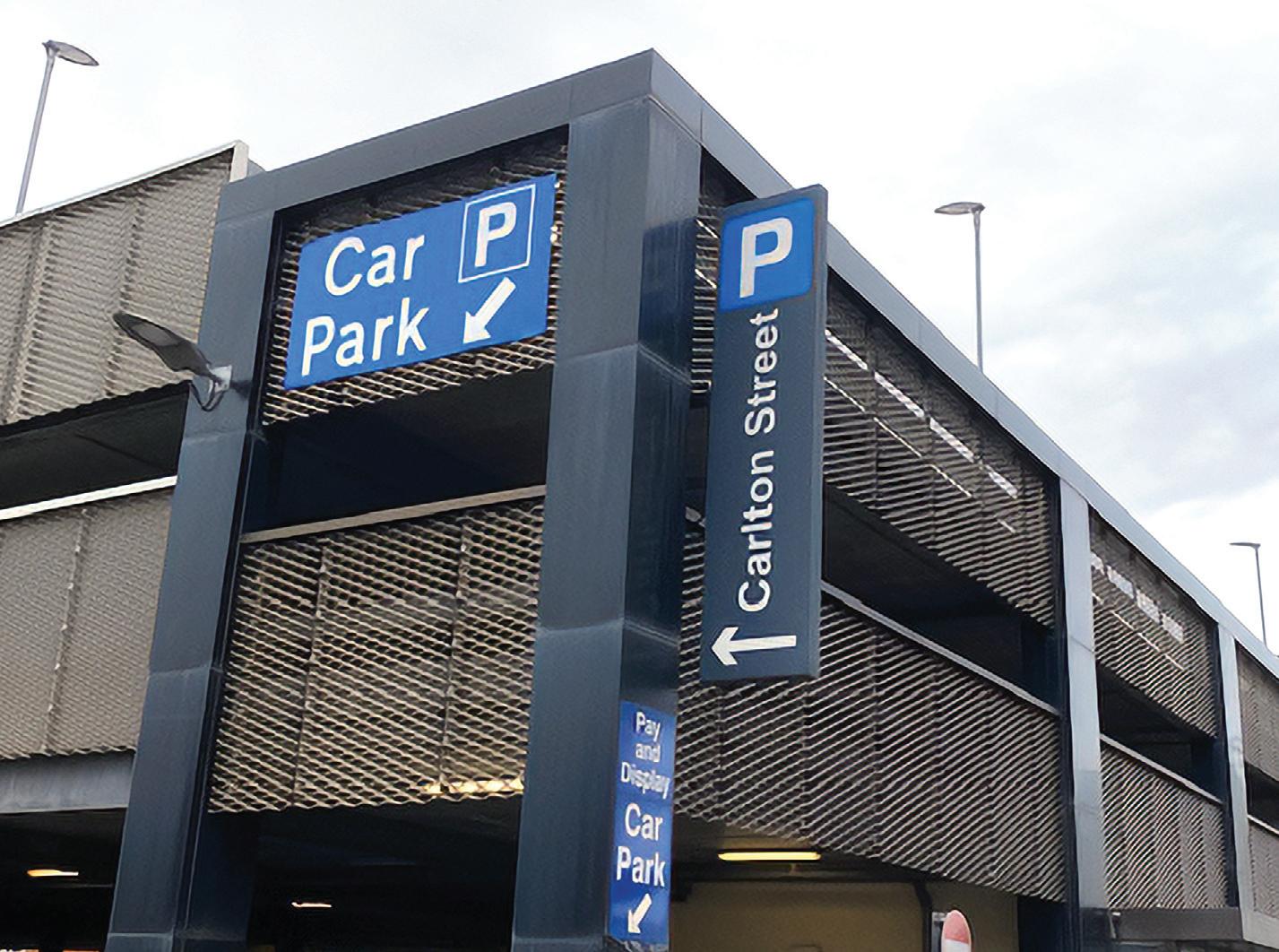

compartmentation and protection to the escape routes and the operation of electric vehicles, with a particular concern around the charging of EVs. The engineer’s assessment confirmed that an EV fire would lead to a risk of partial collapse of the structure.
The car park’s fluorescent lighting system is expensive to run and spares are now hard to find. The best option would be for this to be replaced with an LED lighting system.
The problems were set in a report to the council’s corporate, assets, transport and environmental services scrutiny committee on 3 July. The report set out options ranging from repair to demolition and replacement.
A report presented by officers to North Somerset Council set out four options to be considered for the car park and funding has been allocated to undertake a feasibillty appraisal of four options.
• Option 1: Permanently close the upper floors and operate as a ground floor car park only, there is a requirement for some investment to install the LED lighting, upgrade the fire alarm system, decommission and remove the EV charging within the building. Undertake structural repairs, address water leaks and carry out fire safety works. This option would provide 103 spaces.
• Option 2: Reopen all floors but with reduced capacity to remove the overloading risk from EV and very heavy vehicles. Undertake all repairs and
Senior technical manager Stephen Matthews told councillors: “We are tied into the lease for another 33 years. We have no choice but to keep paying the lease.”
A condition of the lease requires the council to keep the building in good order to keep 350 spaces available, but this condition is not being enforced by the landlord. However, Matthews told councillors: “If push came to shove, they could make us do each bit of repair required under the lease.”
Chair of the committee, Cllr Steve Bridger, said: “I have been a councillor for six years and it has been one of the grimmest, most depressing, damaging reports I have read.”
refurbishment works including lifts, flooring, water ingress, alarms, lighting and fire safety. This would provide 283 spaces.
• Option 3: Close the car park.
• Option 4: Demolish the existing car park and re-build on the same site. This would be a new multi-storey car park and is estimated to provide in the region of 380 spaces.
In addition to the primary operation of the building as a car park, the options review will consider the potential for additional income generation from the car park with non-parking and the ability to have fire protected storage for electric bicycle parking for staff.
A feasibility study on the costs of the potential options is expected to be presented to the council by October.
LockerQuest identifies best car park locations for pick-up points
Motorists using NCP car parks across the UK can now access smart parcel delivery and collection lockers following the installation of parcel lockers.
Parcel locker location company LockerQuest has secured space for 103 YEEP! parcel lockers across the NCP estate.
The NCP car parks to offer YEEP! lockers include Stanley Street in Manchester, New Bailey in Salford, Edinburgh Castle, Londonderry House in Birmingham, Pipers Row in Wolverhampton, and Finsbury Forecourt in London.
Over the coming months, LockerQuest will facilitate the installation of additional lockers including Thinventory and Shift Collect at a number of other NCP car park sites.
NCP new sites project assistant Klaudia Simakoloyi said: “We’re delighted to partner with
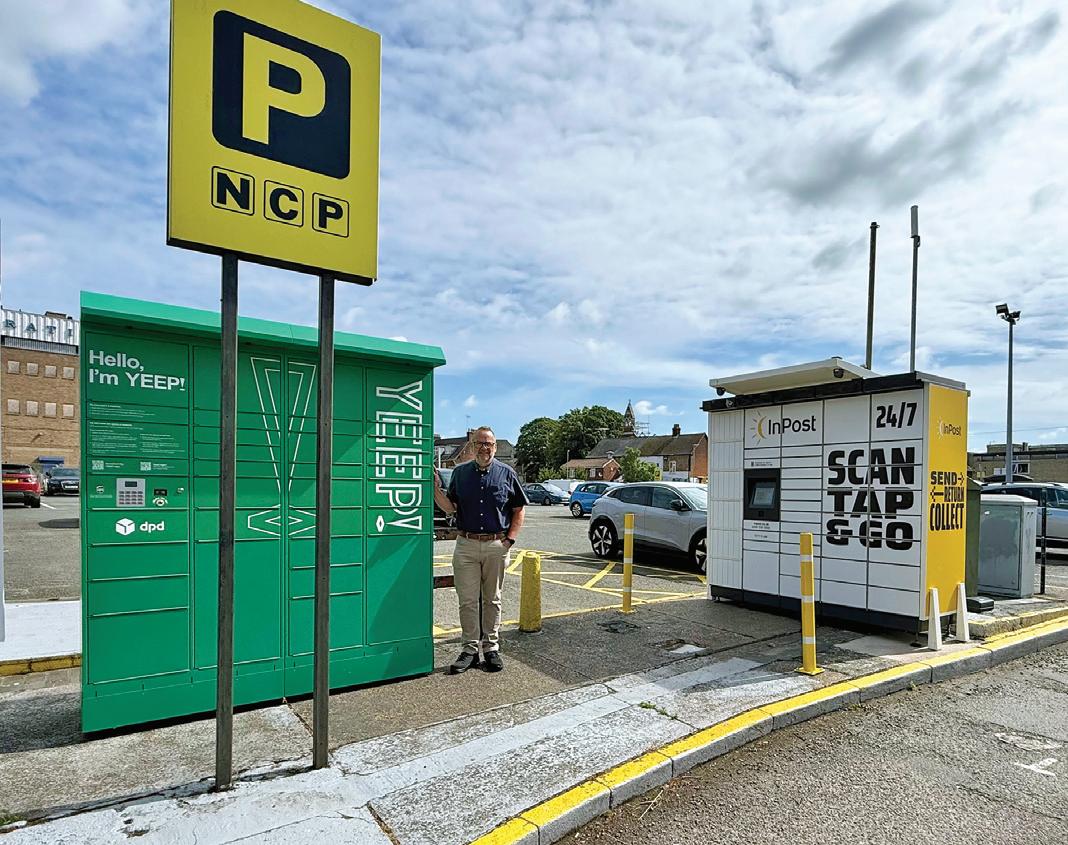
LockerQuest to bring convenient parcel services to our customers.
The YEEP! lockers enhance the overall customer experience at our car parks while generating additional revenue from previously unused space.”
The partnership addresses the growing demand for convenient parcel services as e-commerce continues to expand.

By placing lockers in car parks, LockerQuest and NCP say they are meeting consumer needs for flexible delivery options that fit around busy lifestyles.
LockerQuest chief executive Jonathan White said: “Our partnership with NCP represents a major milestone in expanding parcel locker accessibility across the UK. Car parks are ideal loca-

Automated luggage lockers have been installed at the Q-Park Marble Arch car park in London. The lockers have been supplied by Lockerpoint, a provider of fully automated luggage lockers designed to offer convenient short-term storage in high-traffic urban areas, transport hubs, and commercial venues.
Lockerpoint’s systems allow users to store their belongings safely without the need for staff assistance. The lockers are accessible 24/7, support contactless payment, and are built to accommodate a range of luggage sizes.
Q-Park has been working with
Lockerpoint in the Netherlands since 2019, with its secure luggage lockers available at Q-Park locations in cities such as Amsterdam, Amstelveen, Eindhoven and Maastricht.
Q-Park is now offering Lockerpoint the opportunity to install its secure lockers at Q-Park Marble Arch in central London.
This initiative aligns with Q-Park’s strategy for the creation of Sustainable Mobility Hubs. The aim is to evolve parking facilities to become vital instruments to help realise urban accessibility, sustainability and liveability.
In addition to car parking, Q-Park aims to
tions for parcel lockers as they serve high volumes of people daily and offer the security and accessibility that modern consumers demand. In addition, NCP car parks are located in the heart of towns and cities, making them ideal for people that either live or work close by.
“Our space partners receive guaranteed annual rental income for each locker installed, with no installation or maintenance costs. The lockers generate additional revenue streams while enhancing the customer experience for car park users.”
LockerQuest’s service includes site surveys, approvals, installation and ongoing management.
To date LockerQuest has installed more than 1,130 lockers at locations across the UK, including shopping centres, convenience stores, train stations, car parks, hotels, pubs and leisure centres to name a few.
LockerQuest works with brands including YEEP!, Amazon, Shift Collect and Thinventory.
provide access for shared mobility schemes, rapid electric fleet charging, last mile delivery and retail spaces all housed within their safe and secure multi-purpose parking facilities.
Lockerpoint not only provides Q-Park customers with the option to securely store their luggage, but the service is also available to the general public.
Located beneath Hyde Park, Q-Park Marble Arch is ideally positioned for visitors to nearby attractions such as the Moco Museum, Frameless Immersive Art Experience and The Wallace Collection, as well as for those attending events in Hyde Park like British Summer Time concerts or Winter Wonderland, or simply exploring landmarks such as Oxford Street and Paddington.
John Denton, director of commercial at Q-Park UK, said: “We are thrilled to welcome Lockerpoint into Q-Park Marble Arch. Yet another addition to this established mobility hub demonstrates why Q-Park are leading the discussion on the future of the parking industry.”
Jorn and Robert Jan, directors of Lockerpoint, added: “We’re pleased to expand our presence alongside Q-Park into a new country. Their outstanding network of prime city centre locations made this partnership a natural and strategic step in growing our business.”
Q-Park operates a network of car parks across London that provide convenient access to destinations such as Chinatown, Soho, Knightsbridge, Oxford Street, and Tower Bridge.
Operators can now build reports that meet their operational needs
Enforcement and compliance management software developer Unity5 has launched a new Dynamic Dashboards service for its Zatpark product.
Zatpark users can now build their own visual reporting dashboards that present important data and see the latest trends.
To support the new function, default reports will be automatically added to accounts.
Features of Dynamic Dashboards include a drag-anddrop functionality that helps administrators build their visual reporting dashboards.
Each dashboard component is configurable, ensuring that users can pull together the exact mix of reports and data they want in one place.
James Hampton, product manager at Unity5, said: “The new addition is a game-changer for our users. Customers can quickly see their performance

indicators. They can choose to add key performance indicators, such as tickets issued per site, per pay, or payments received by week, saving customers time and creating efficiencies.
Ecom6, a payment solution offered by Unity5, now includes integrated acquiring capabilities that provide businesses with both gateway and acquiring services through a single system.
Ecom6 is a payment gateway solution. With the integration of acquiring services, Ecom6 now offers
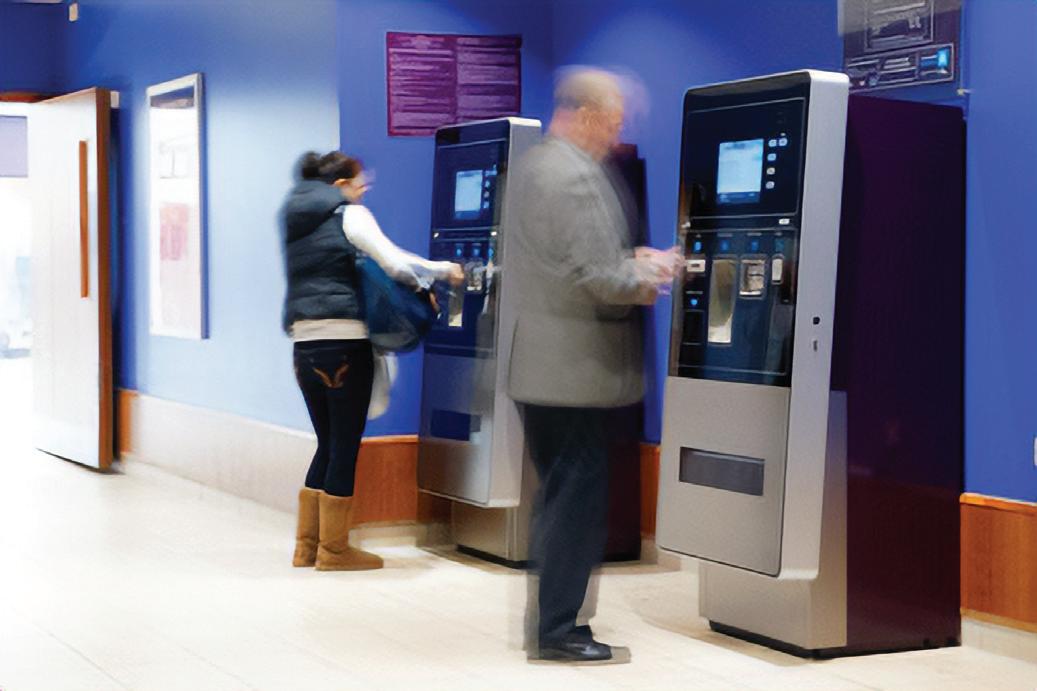
Spelthorne Borough Council has commissioned WPS UK to supply payment systems for shoppers’ car parks in Stainesupon-Thames.
ParkAdvance+ systems will be installed two locations – a surface lot and a multi-storey car park – offering a combined capacity of around 900 spaces.
Both car parks are connected to the Elmsleigh shopping centre, a destination with over 50 shops.
The new set-up will replace the previous system with a ticketless, paperless approach based on automatic number
plate recognition (ANPR).
The system integrates with the borough-wide variable message system (VMS) to guide drivers to available spaces in real-time.
The new solution was selected after a competitive tender process because of key features including:
• digital payments, including seamless integration with the RingGo app
• no paper tickets, reducing waste and operational hassle
• scalability, allowing the system to grow with future needs.
“This truly dynamic display means that multiple reports can be easily combined to form a ‘daily dashboard’, offering an overview that is unrivalled in the market, revealing trends that can be used to make future datadriven decisions. Once advanced dashboards are initially set up, they offer a future-proof and repeating visual snapshot of the status of the user’s business or enforcement ecosystem.”
Key features include:
• Multiple visual dashboards: users can quickly see their performance indicators (PIs) such as tickets Issued per site, per day, or payments received by week.
a suite of merchant services designed to simplify payment processing and enhance operational efficiency.
Ecom6’s new offering provides clients with greater control over payment processing, potential cost benefits and improved service features.
• Data displayed from custom queries: administrators can view reports from custom queries as a single value, a count of values, or a data table.
Hampton added: “This addition is the next in a swathe of groundbreaking features being realised by Unity5 that strengthen its position as a leader in software and the parking industry.”


Vauxhall found there has been no change in the number of on-street chargers adapted specifically for disabled drivers

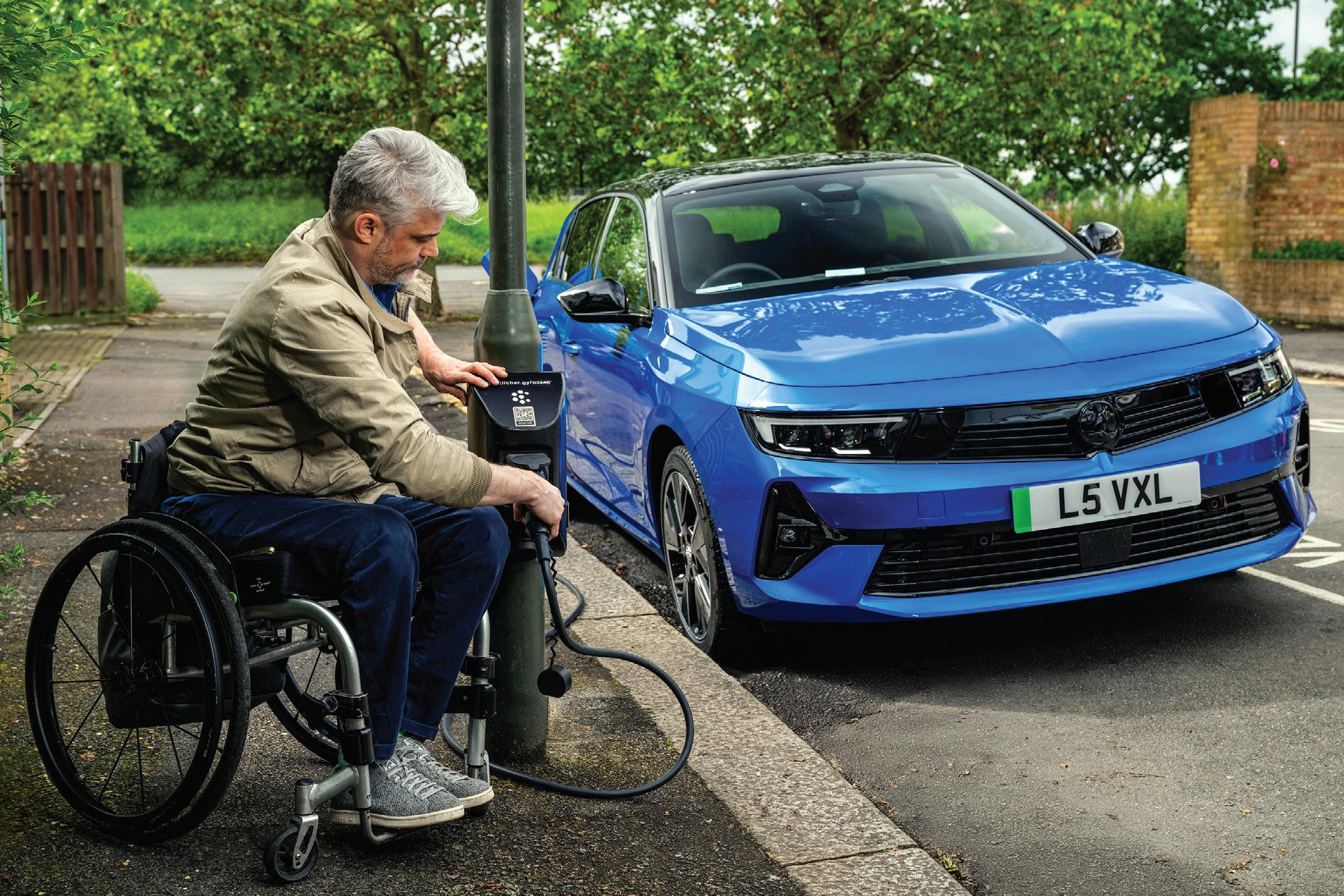
Vauxhall highlights lack of accessible on-street chargepoint provision for disabled EV drivers
More than a third of UK councils do not provide any onstreet electric vehicle charging suitable for disabled drivers, according to new Freedom of Information (FOI) research by Vauxhall. In the research 111 of the 289 councils who responded to Vauxhall said they have no on-street chargepoints that have either been specifically adapted for disabled drivers, or any that follow the British Standards Institution’s PAS 1899:2022, a national accessible charging standard co-sponsored by the Motability Foundation and UK government.
The findings follow on from previous Freedom of Information research released by Vauxhall in 2024 assessing the considerations being given towards disabled drivers by local authorities when installing on-street residential chargepoints.
Compared to 2024, Vauxhall found there has been no change in the number of on-street chargers adapted specifically for disabled drivers, remaining static at 2.2% of all on-street chargers – this is despite latest figures from the Department for Transport showing a 27% year on year increase in the number of on-street chargers across the UK as of the end of April.
The new research is part of Vauxhall’s ongoing Electric Streets of Britain initiative, which aims to support the 40% of UK households without off-street parking. Vauxhall is a leading supplier of electric vehicles to the Motability Scheme. While there are over 16 million disabled people in the UK, research by the Motability Foundation, predicts that 1.35 million disabled drivers will be partially or fully reliant on public charging infrastructure by 2035.
Data published in the Motability Scheme’s new EV Transition Tracker, also highlights the ongoing barriers disabled people face in the transition to EVs. The research shows that 65% of Scheme customers will only make the shift to an EV when they have no other choice. When asked about EV charging, 45% of customers said it’s too difficult to find nearby public charging points.
Steve Catlin, managing director, Vauxhall, said: “Limited access to public charging is known to be a barrier for Britain’s disabled motorists wishing to switch to EVs – particularly those who have no home charging capability. The number of councils who do not provide charging provisions specifically for those with disabilities, as highlighted in our new research, is concerning – we need to ensure that all drivers, wherever they are, can easily find and access chargepoints if we are hoping to bring all drivers on the UK’s electrification journey.
“Through Electric Streets of Britain, Vauxhall is continuing to encourage drivers to register their need for on-street charging near them, and for disabled drivers to say where they require specific accessible charging. As the number of on-street chargers continues to rise, we want to see the number of chargers which have been adapted for disabled drivers to grow alongside this. All drivers should be able to access public charging, whatever their need, to ensure going electric is a practical and viable option.”
A recent paper from the House of Commons’ Public Accounts Committee into the UK’s EV chargepoint network highlighted obstructions to chargepoints, such as those which are positioned too close to kerbs or use heavy cables, making it hard for wheelchair users to access charging. The MPs concluded that chargepoints being installed without considering PAS 1899:2022 risks the charging network growing without meeting the needs of disabled drivers.
Andrew Miller, chief executive of Motability Operations, which runs the Motability Scheme, said: “We need to make sure disabled people are not left behind as the UK transitions to EVs. We hear from our customers every day and many of them tell us the same thing. They’re struggling with the change, and public charging is their biggest worry. This uncertainty is stopping people from making the switch – and could lead to a cliff edge transition that leaves thousands of disabled people with no access to mobility.”
Vauxhall introduced Electric Streets of Britain in 2023, working alongside charging operators Char.gy, Connected Kerb and SureCharge to make electric vehicle infrastructure accessible for all drivers wishing to drive an EV.
Through Electric Streets of Britain, a national database has been established so UK motorists who want to have on-street residential EV chargers installed near them can register their interest. So far, over 12,000 streets have been logged as needing on-street charging across the country through electricstreets.co.uk.
The database also provides drivers with the option to register whether or not they need on-street charging with particular requirements to suit their disability. Since launch, over 150 drivers who have registered for charging near them through Electric Streets have told Vauxhall they require disabled-access off-street parking.
Vauxhall will be continuing to share its registration data with councils to help inform where on-street charging is needed, and the consideration for disabled-access parking is included in charging strategies across the country.
Responding to the research, Zoe Rush, marketing and campaigns manager at the charity Disabled Motoring UK (DMUK), said: “At DMUK we want disabled people to feel safe, confident, independent, and respected. With the current lack of attention given to providing accessible EV chargers on and off street for disabled motorists we are still a long way from providing a fair and inclusive society.
“The lack of accessible chargers is an issue that DMUK is fighting against, and we hope to improve the situation through our Park Access EV accreditation which recognises car parks that provide accessible parking and charging in accordance with the government’s PAS 1899 standards. There are currently only three car parks in the UK that have met the criteria for Park Access EV but by working closely with chargepoint providers, local authorities and car park operators we hope these numbers will grow.”

People with disabilities depend on schemes such as the Blue Badge permit and provision of dedicated parking bays at destination car parks in order to go about their daily lives in an independent manner. However, it is all too common to find parking spaces intended for people with disabilities being misused. Disabled Motoring UK (DMUK) is addressing this issue with the return of its Baywatch campaign. Baywatch highlights the ongoing abuse of disabled parking bays and Blue Badge misuse in supermarket car parks, calling for greater operator accountability. DMUK invited disabled motorists, and those who travel with them, to complete a short survey each time they visit the supermarket between 2 July and 15 August. The biennial survey provides data on issues they encounter when parking. When the campaign last ran, in 2022, DMUK received over 1,000 responses.
Graham Footer, chief executive of DMUK, said: “For many disabled motorists, finding an available, properly enforced parking bay remains a persistent challenge and disabled people feel at risk of being judged or harassed, particularly those with hidden disabilities. With little evidence of enforcement, disabled motorists sometimes feel pressured to put their personal safety at risk by challenging disabled bay abuse. DMUK wants all disabled motorists to feel safe, confident, independent, and respected. It’s time for greater accountability in both public and private parking.”
Half of drivers with disabilities are finding the weight of ultra-rapid EV charging cables a challenge to use. Electric vehicle drivers’ association EVA England is concerned that faster, and therefore heavier, electric vehicle charging cables are creating a barrier for disabled drivers, threatening to exclude over a million people from the UK’s transition to electric transport. The EVA England Cable Weight Survey Report, based on a national survey of EV drivers in 2025, shows that 51% of drivers with disabilities find heavier ultra-rapid EV charging cables hard or extremely hard to use. Even at slower charging speeds, significant numbers of disabled drivers report difficulties that limit their ability to travel independently.
Key findings from the report include:
• Over half of disabled drivers struggle with ultra-rapid (defined here as up to 350kW) charger cables, compared to just 21% of other drivers.
• 53% of disabled drivers report at least some difficulty with rapid (up to 50kW) chargers, compared to 10% of other drivers.
• Even at slower speeds, around 28% of disabled drivers experience difficulties using fast chargers of up to 22kW.
Survey participants described physical strain, risk of falling, and needing to ask strangers for help when using charging cables.
One respondent shared: “Several times I’ve almost overbalanced with weight of the cable. I needed to ask for help a few weeks ago at a services.” Another stressed that: “My wife is disabled and could currently not manage any rapid or ultra-rapid cables at all.”
Despite the rapid progress being made in rolling out EV infrastructure – with over 80,000 public chargepoints now available across the UK – just 2.3% are currently considered accessible to disabled users. By 2035, around 1.35 million disabled people are expected to rely on public charging.
Vicky Edmonds, chief executive of EVA England, said: “The UK’s EV roll-out is a major success story. But for over a million drivers with disabilities, it risks becoming one of exclusion. Heavy charging cables make public EV charging difficult or impossible for many. If we don’t prioritise accessibility now, we’re locking millions of people out of electric driving for years, possibly even decades. That is why this report is so important – it will feed into important work with government and industry to ensure accessibility standards truly reflect everyday drivers’ needs.”
EVA England says the current accessibility concerns are widespread. 2022 saw the publication of the PAS 1899 standard –government-backed EV chargepoint accessibility guidelines providing a minimum standard for compliance with common accessibility requirements. However, compliance with PAS 1899 is voluntary, and few chargepoints are currently considered fully compliant. The government is working with EV sector stakeholders, including EVA England, to review and update the standard and publish new guidance to make sure that all drivers, regardless of their ability, can use public charging infrastructure.
The Planning and Infrastructure Bill, currently at Committee Stage in the House of Lords, is proposing changes to speed up new chargepoint installations by granting installers access to a much simpler and cost-effective permit system to carry out essential street works – similar to major telecoms and energy providers.
A coalition of EV-focussed organisations including EVA England and the Motability Foundation are proposing a small amendment to the Bill that would provide government with the necessary powers to enforce accessibility requirements in the future if needed. It was tabled in the House of Commons by Sir Jeremy Wright MP, but not accepted by the government .



Anew £650m grant fund has been launched by the UK government to support sales of electric cars. With drivers citing upfront costs as a key barrier to adoption, the government hopes the Electric Car Grant (ECG) will narrow the upfront cost between petrol and electric vehicles, giving more people access to savings of up to £1,500 a year in fuel and running costs compared to a petrol car. Discounts up to £3,750 will be available via the ECG at the point of sale for eligible new electric cars priced at or under £37,000.
Manufacturers need to apply for their zero-emission cars to be part of the grant scheme. Funding will be available until the 2028 to 2029 financial year.
Transport secretary Heidi Alexander said: “The EV grant will not only allow people to keep more of their hard-earned money –it’ll help our automotive sector seize one of the biggest opportunities of the 21st century. And with over 82,000 public chargepoints now available across the UK, we’ve built the infrastructure families need to make the switch with confidence. This is our Plan for Change in action. We’re backing British drivers, British jobs and British growth.”
The grant will work alongside the Zero Emission Vehicle (ZEV) Mandate, which requires manufacturers to sell increasing percentages of zero-emission vehicles each year. Some 380,000 zero-emission cars were registered last year.
Mike Hawes, chief executive of the Society of Motor Manufactures & Traders (SMMT), said: “The return of government support for the purchase of electric vehicles is a clear signal to consumers that now is the time to switch. Rapid deployment and availability of this grant over the next few years will help provide the momentum that is essential to take the EV market from just 1 in 4 today, to 4 in 5 by the end of the decade.”
Simon Williams, RAC head of policy, said: “Within weeks, discounted cars should start appearing at dealerships across the country.
The Citroën ë-C3 is among vehicles qualifying for ECG support


And, as the biggest savings will be given to cars with the strongest ‘green’ manufacturing credentials, drivers will be picking models that are not only better for their wallets, but better for the planet too.”
Dan Caesar, chief executive of Electric Vehicles UK, said: “A targeted incentive programme is a significant step forward in encouraging consumers to buy battery electric vehicles and to make them more accessible. While battery-only EVs are much cheaper to buy and run than most realise, surveys show that cost misperceptions are the primary reason for hesitance. A generous grant of this nature gives a new group of interested buyers, who might have thought that going electric was beyond them, a gentle nudge into what is great tech. More than nine out of 10 battery EV drivers will never revert, and there’s a reason for that.”
The public and industry are being encouraged to share their views on future of self-driving vehicles before the first services become available in the UK next year. The government has launched a consultation on the Automated Passenger Services (APS) permitting scheme and the draft statutory instrument, a key legal element of how taxi, private-hire and buslike services of self-driving vehicles will be regulated once they take to roads in Great Britain.
The consultation follows the recent government decision to fast-track pilots of self-driving passenger vehicles to Spring 2026, helping the industry to innovate and grow. This will allow firms to pilot small scale services without a safety driver for the first time – which could be available to members of the public to book via an app – before a potential wider roll-out
Future of roads minister Lilian Greenwood said:
“Self-driving vehicles are one of the most exciting opportunities to improve transport for so many people, especially those in rural areas or unable to drive. We want to work with passengers and industry to make this new form of transport safe and accessible, as we take our next steps towards adoption.”
Through the consultation, representative groups, industry stakeholders, trade unions and members of the public will be able to make their views heard and influence future government policy over a variety of areas critical for self-driving vehicles to run safely and efficiently.
These include: how self-driving vehicles can be made as accessible as possible for disabled and older people; how services of self-driving vehicles are approved by
The ECG scheme was unveiled after the government announced a £63m package to support at-home charging for households without driveways, transition NHS fleets to electric and create thousands of chargepoints at business depots. There are now 82,000 public chargepoints nationwide.
Vicky Read, chief executive of charging sector trade association ChargeUK, said: “This announcement is brilliant news – for drivers and for the UK’s transition to electric vehicles. With a commitment to invest £6 billion through to 2030, the UK’s charging industry has rolled out infrastructure ahead of demand to ensure that when drivers switch, the network is there to make charging as convenient as possible. There are now 82,000 public chargepoints and a new one goes in the ground every 29 minutes on average.”
councils; and when a permit to operate a service should be varied, suspended or withdrawn.
The APS scheme is a part of the of the Automated Vehicles (AV) Act which will regulate taxi, private-hire, and bus-like self-driving vehicles once it is implemented in full in the second half of 2027.
The AV Act will require self-driving vehicles to achieve a level of safety at least as high as competent and careful human drivers, and will undergo rigorous safety tests before being allowed on roads.
Self-driving trials have been taking place in the UK since January 2015.
UK AV specialist Oxa has supported ‘bus-like’ services in the US and started rolling out self-driving vehicles at Heathrow Airport to improve baggage handling.
Wayve has secured an investment of over $1 billion and announced partnerships with Nissan and Uber.
Government funding will encourage use of cross-pavement cables
The government has announced a £63m funding package to support the roll-out of electric vehicle infrastructure.
There will be specific support for at-home charging by EV owners, including encouragement for the use of cross-pavement gullies. The government says its aim is to enable more families to charge EVs using domestic electricity even if they do not have a driveway.
A £25m scheme will see local authorities able to increase athome charging by enabling running cross-pavement technology that allow cables to run beneath pavements, connecting homes directly to parked vehicles.
The UK’s public charging network which has reached a record 82,000 public chargepoints, with a further 100,000 expected to be installed as a result of support from the government’s Local EV Infrastructure


(LEVI) Fund and £6bn of private investment committed to 2030.
The government is also updating EV charging signage on major roads, reflecting a growing number of charging hubs. The number of EV charging hubs have more than doubled since the beginning of 2023 and what are described as immediate changes will allow larger EV charging hubs to be signposted from major A-roads for the first time.
London Councils has published guidance to support boroughs’ roll-out of cross-pavement electric vehicle charging solutions that enable residents without off-street parking to charge EVs at home using their own electricity supply.
London is home to 193,000 plug-in cars and vans, with that number expected to rise to 1.4 million by 2030.
While 90% of EV users prefer the cost savings and convenience of home charging, 61% of Londoners do not have access to offstreet parking, creating a barrier to EV uptake in the capital. This gap has led to a rise in EV drivers trailing charging cables across pavements, creating trip hazards and accessibility risks, especially for older residents and those with mobility or visual impairments.
Cross-pavement charging solutions can either be a surface ‘gully’ or a system buried under the pavement that allows charging cables from a home chargepoint to
be connected to a parked EV.
Cross-pavement solutions require approval from the local authority. Enfield Council trialled a cross-pavement charging channel with Kerbo Charge in 2024. Bromley Council has rolled out a similar scheme using the Gul-e solution. Eligible residents can install a flush-mounted gully outside their homes.
Mayor Brenda Dacres, London Councils’ executive member for transport and environment, said: “We’re serious about tackling air pollution and cutting carbon emissions in London. That’s why it’s crucial to make switching to electric vehicles an option for more Londoners – especially those without driveways. Cross-pavement charging is a simple but powerful innovation that can help open up affordable home charging to thousands of residents. Just as importantly, it helps reduce trip hazards caused by loose charging cables, keeping our pavements safe and accessible for all.”
Alongside the funding support for electric car drivers, the government is also launching a new Depot Charging Scheme to help businesses install charging points at depots used by heavy goods vehicles, van and coaches.
A new fund will assist the National Health Service electrify its vehicle fleet. The NHS in England will be allocated an £8m fund to support the electrification of ambulances and medical fleets across over 200 NHS sites.
The latest announcements on EVs are being positioned by the government as a way of showing it is on the side of drivers, with press statements referring to £1.6bn being allocated to tackling potholes and fuel duty being frozen at 5p until Spring 2026.
Transport secretary Heidi Alexander said: “We are making it easier and cheaper to own an electric vehicle. Access to charging is a barrier for people thinking of making the switch, so we are tackling that head on so that everyone – whether or not they have a driveway – can access the benefits of going electric.”
The government announced £400m in the Spending Review to support charging infrastructure, including on the strategic road network. It says some 1,200 new charging sockets will deliver a more efficient health system whilst generating millions in cost savings in maintenance and fuel costs. It predicts these savings can be prioritised for patient care and help rebuild the NHS.
Oxfordshire residents without off-street parking can apply to join a scheme that allows them to charge an electric vehicle outside their own home. The pilot project, being delivered by Oxfordshire County Council, is set to accelerate the transition to cleaner, greener electric vehicles.
It is estimated that 28% of households in Oxfordshire (86,000) lack off street parking and therefore may not be able to easily install a home charger (source: Field Dynamics).
EV charging cable channels are seen as an affordable and
practical solution for people without off-street parking who want to switch their petrol or diesel car to an electric one. They allow the cable from a home charger to cross the pavement and connect to a kerbside EV without causing a trip hazard.
The project – believed to be the largest of its kind in the UK – benefits from a £700,000 government grant. The funding will reduce the cost of the EV charging cable channel and its installation for the first 500 residents to successfully apply through the council’s website.
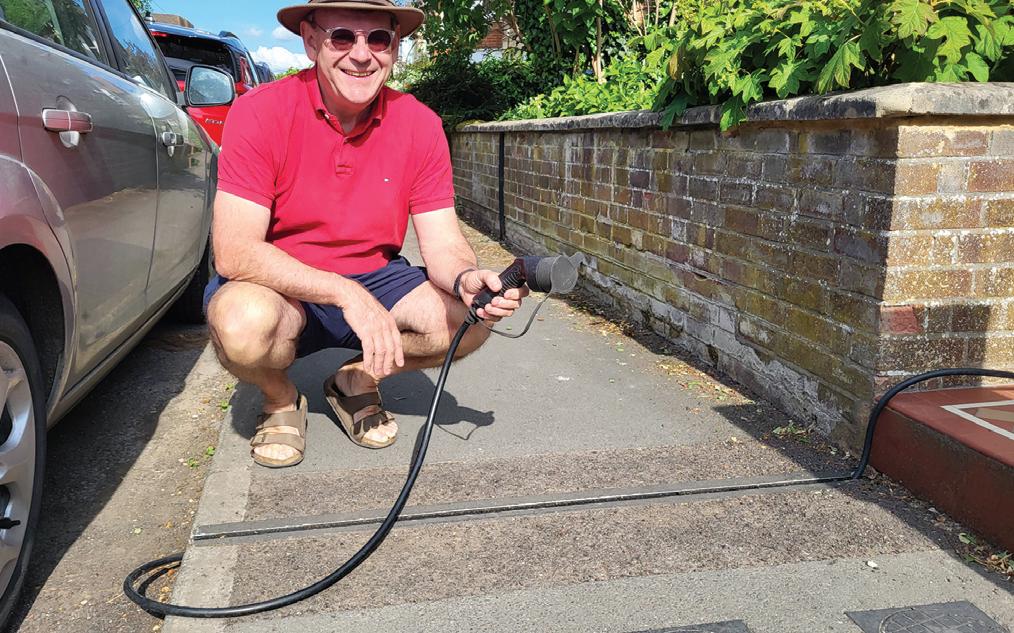
New 30-chargepoint facility will serve local people and tourists
UK charging network InstaVolt has entered into a 40-year lease with the Fonthill Estate to build a 30 ultra-rapid charger superhub, with a large café and farm shop on the A303 at Chicklade in Wiltshire.
The project has received planning and a grid connection, so construction is expected to commence in August 2025, ahead of an opening planned for late Spring 2026.
The hub, located 10 miles west of Stonehenge, Wiltshire, will support drivers who use the A303, including communities local to the area, tourists travelling to the West Country or those on longer journeys between the east and west of the UK.
Part of the UK’s Strategic Road Network, routes such as the A303 have been recently highlighted by the government, with support from National Highways to install new signage identifying


existing EV infrastructure. The signage will show non-EV drivers that charging is plentiful, reliable and increasingly widespread.
InstaVolt will be deploying large batteries and solar on-site, which will help to provide periods of discounted charging like the 50p per kWh offered at its new superhub in Winchester.
Delvin Lane, chief executive of InstaVolt, said: “Chicklade is the next step in our mission to combine scale, sustainability and convenience. With 30 ultra-rapid
chargers and an on-site farm shop and café, this peaceful stop will become a vital charging destination along the A303 – a very popular and busy route – powered by the latest in renewable energy innovation.”
The ultra-rapid charging hub will be located on the Fonthill Estate. InstaVolt has worked with the estate and its advisors over the last two years to develop the superhub plans.
The Fonthill Estate commented: “We are delighted to be
working with InstaVolt, a genuine innovator in the net zero mobility sector. This partnership represents a long-term, sustainable investment that supports our local community, enhances the regional road network and contributes meaningfully to regeneration and job creation across the area.”
Future of roads minister Lilian Greenwood said: “We have just announced record discounts to help make EV ownership a reality for thousands more people, alongside making it easier to charge at home so more drivers can run their EV for as little as 2p a mile – that’s London to Birmingham for £2.50.
“The latest chargepoint figures show that alongside lowering upfront costs, we’re also making fantastic progress towards expanding our charging network across the UK, as this latest EV ultra-rapid charging hub by InstaVolt shows. With a new chargepoint added to the network every half an hour, we’re helping put range anxiety firmly in the rear-view mirror.”
Charging network Be.EV is providing a pair of ultra-rapid chargers in Blackburn, Lancashire.
Be.EV has partnered with AAAZ Investments to install the charging bays at a site on Livesy Branch Road which features a Tesco Express store.
The deal will see Be.EV invest £223,000 to install two 150kW Kempower ultra-rapid charging bays at the site.


Zest has opened an ultra-rapid EV charging facility Edmonton, which is in the London Borough of Enfield. Situated on Fairfield Road, conveniently located just off the busy North Circular Road, the facility offers 18 charging spaces running at speeds of up to 300kW.
Cllr Rick Jewell, cabinet member for transport and waste, said: “This is an important development for Edmonton as we continue to support cleaner, more sustainable travel. Reliable access to ultra-rapid EV charging is essential to help more people make the switch
to electric vehicles. These new charging spaces on Fairfield Road provide the kind of infrastructure our community needs to be part of the transition to a greener future.”
Robin Heap, chief executive at Zest, said: “Public charging must keep pace with the rapid growth of EV adoption, particularly in London where private driveways are less common. Ultra-rapid facilities like this one on Fairfield Road represent a vital investment in Edmonton’s future –supporting residents, local businesses and private hire drivers.”
As well as benefiting local Blackburn residents, the chargepoints will benefit EV drivers taking longer journeys where they need a quick charge. The site is a 10-minute

drive from the M65 which has an average daily traffic flow of over 69,000 vehicles.
Aziz Hajee, director at AAAZ Investments, said: “EV charging has become much more of a priority for us as more EVs hit the road, so it’s important to us to get EV charging at our sites before they become the most common vehicle on the road.
“It was important for us to work with an experienced partner who could advise us on getting the right chargers and make everything as simple as possible, which is exactly what Be.EV has done.”
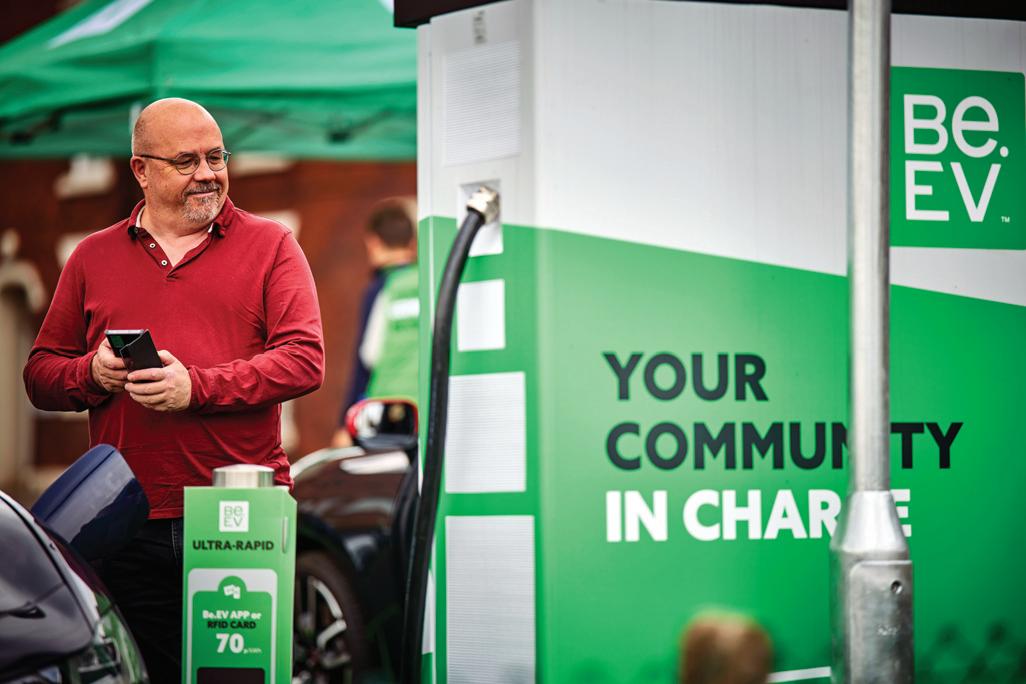
Chargepoints at retail park will offer service around the clock
Osprey Charging has opened a new super-fast EV charging hub in Paisley, close to the M8 and Glasgow Airport.
The purpose-built hub, in the busy Phoenix retail area in Paisley near the M8 and Glasgow Airport, is open 24/7 serving fleets, taxis and private vehicles.
The chargepoints accept all contactless bank cards and fleet cards, are compatible with every electric vehicle on the market today, and have a 24/7 free helpline for customers. A fleet locker on the site supports local engineers and business drivers.
Scotland’s transport secretary Fiona Hyslop officially opened the new super-fast EV charging hub. She met Osprey’s operations director Lewis Gardiner and head of external affairs Dora Clarke for a tour of the hub and to discuss the opportunities and challenges of building EV charg-

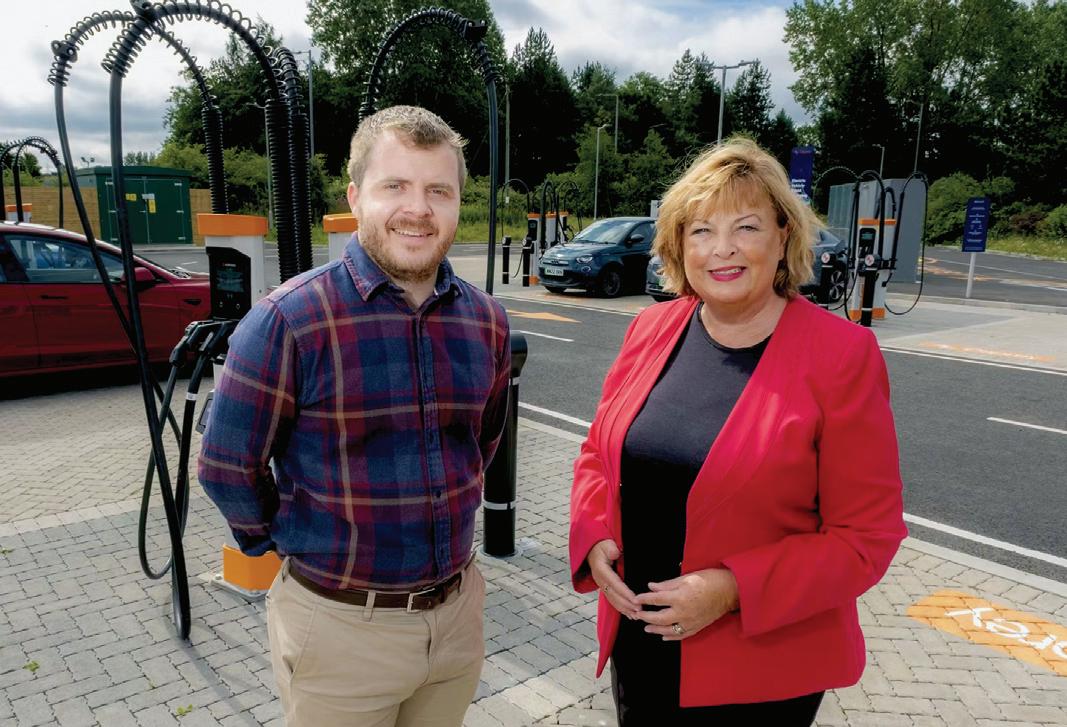
ing infrastructure in Scotland.
The transport secretary said: “I’m delighted to open Osprey’s new ultra-rapid charging hub near Glasgow Airport – now the largest 24/7 public electric vehicle charging site in Scotland. Not only is this sort of private sector investment exactly what we need to see to support our vision for public EV charging, it’s in a prime location offering high-powered EV charging to fleets, taxis and everyday drivers travelling around Glasgow and
Cadw, the Welsh Government’s historic environment service, is introducing EV charging at a number heritage sites. Evolt has installed a series of 22kW public chargepoints across an initial nine Cadw sites, including the Tintern Abbey in Monmouthshire and Castell Harlech in the Yr Wyddfa National Park.
Working at these sites involved liaising with the thirdparty owners of adjoining car parks. A further challenge has been getting power to the sites. Installing new supplies near historic monuments requires Scheduled Monument Consent due to the potential for archaeological discoveries.
In addition to the new public charging infrastructure, Evolt has installed units at four Cadw depots to charge its fleet of electric cars and vans. Evolt has installed charging units at four Cadw depots – in Caernarfon, Caerphilly, Crumlin and Haverfordwest – to support electric cars and vans used by Cadw’s regional maintenance teams who travel to multiple monuments in a
single day. RFID cards enable staff to top up at public Cadw charging points en route.
The project, funded by Transport for Wales (TfW), has been delivered as part of a Sustainable Development Plan to deliver a greener transport network across the country.
A factor in securing the funding was Cadw’s leadership in advancing the Welsh Government’s net zero strategic plan. It was the first division to transition its works fleet to electric. TfW also recognised the value of supporting Cadw due to the remote locations of many of its sites as this would help address gaps in Wales’s public EV infrastructure.
Jack Sargeant MS, Welsh minister for culture, skills and social partnership, said: “The introduction of reliable and convenient charging infrastructure at nine of Cadw’s historic sites will enable visitors and local residents alike to charge their vehicles, in turn supporting local businesses and communities.”
to and from the airport.”
Drivers will benefit from this dedicated hub that adds 16 new 300kW chargepoints to the national EV charging network, with 24/7 public access near to Glasgow Airport.
Located on Saturn Avenue in the busy Phoenix retail area of Paisley, this is Osprey’s second land acquisition. It was purchased from Showcase Cinemas for its proximity to the M8 and Glasgow Airport. The site is accessible from both the East-
bound and West-bound carriageways of the A737, less than five minutes from the M8 (Junction 29) and less than 10 minutes’ drive from Glasgow Airport’s terminal.
Osprey has redesigned the space specifically for EV charging, with a flow-through layout, pedestrian walkways and spacesaving chargepoints. Osprey’s signature layout maximises accessibility for larger vehicles, and two bays that meet PAS1899 standards.
Drivers can plug in and pop next door to McDonald’s, Tim Hortons or the Marmalade Pot pub, or charge up before or after a trip to the Showcase Cinema.
Ian Johnston, chief executive of Osprey Charging, said: “We’re proud of this carefully designed site located in Paisley at the heart of a busy retail area. By purchasing the land we were able to create a bespoke layout specifically for EV charging that maximises space and ease of use, learning from the success of our award-winning Salmon’s Leap super-hub in Devon.”
Cornwall’s electric vehicle charging network will be given a boost with up to 2,000 chargepoints set to be installed from next year.
Cornwall Council successfully bid for £5.5m from the Department for Transport’s Local Electric Vehicle Infrastructure (LEVI) Fund to bring chargepoints to more areas across the county.
Providing lower power and cheaper residential charging at slower speeds, chargepoints will initially be installed in council car parks, with onstreet charging set to appear as the project progresses.
As part of this work, residents groups and town and parish councils are being asked for their views on where EV chargepoints are most needed.
Residents and local businesses will be able to find out more about the council’s EV charging network, electric vehicles and test-drive a range of vehicles at a free event taking place at the Royal Cornwall Showground on Saturday 13 September.
Cllr Dan Rogerson, cabinet member for transport, said: “With less than five years to go until the ban on new diesel and petrol engines comes into effect, we want to make sure the infrastructure is in place to meet the needs of our residents.
“This funding means we can install chargers in our rural communities where the private sector is unlikely to invest. It also means that, for the first time, we can consider onstreet charging. To make the most difference however, we need to hear from communities about where to install them.”
Cornwall currently ranks in the top 20% of local authority regions for the number of public EV chargepoints.
In 2023, Cornwall Council installed 226 new charging points through the Drive EV2 project. Funded by the European Regional Development Fund and the council’s Carbon Neutral Fund, the charging points were installed in Cornwall Council car parks in 42 locations.
Chargepoint network attracts investment from range of backers
Electric vehicle chargepoint operator GRIDSERVE has secured £100m in new equity investment from institutional shareholders to underpin its growth.
Alongside existing equity and debt facilities, the capital, committed by TPG, Infracapital and Mitsubishi, will support GRIDSERVE in capitalising on longterm opportunities as it continues to accelerate the roll-out of high power charging infrastructure across the UK’s busiest roads.
Roy Williamson, GRIDSERVE chair, said: “This equity raise places GRIDSERVE in a robust position to sustain its network growth and signifies a strong vote of confidence in the company’s future growth prospects. GRIDSERVE’s deep EV expertise sets the industry standard with a reliable 99% uptime, customer satisfaction, and service excellence, while we are further strengthening strategic partner-

ships with leading locations.”
GRIDSERVE says it is trading profitably and operates over 200 locations with 1,500 charging bays, delivering over 250,000 charging sessions monthly.
Daniel Kunkel, GRIDSERVE CEO, said: “I am delighted that the growth in confidence and investment from our shareholders continues to give us the ability to grow our capacity to serve our customers, building on our status as the most used network in the UK. Our exceptional 5-star rated customer experience
sets the industry standard for satisfaction and service excellence, while our strong strategic partnerships with leading locations provides a base for the further strengthening of our platform for growth, which comes at a critical moment in the energy transition.”
Priya Veerapen, managing director of Infracapital, said: “We are proud to continue supporting GRIDSERVE as it scales its innovative and essential charging infrastructure. This latest investment demonstrates our
Osprey Charging has been backed by a group of financial institutions. The funding will accelerate the roll-out of superfast EV charging hubs at prime locations across the UK.
The club of lenders includes current investor Novuna Business Finance (part of Mitsubishi HC Capital UK PLC) and new backers Société Générale, Aldermore and the UK Government’s National Wealth Fund. They have collectively provided £110m in senior debt facilities.
Besides Novuna, Osprey also retains support from its original far-sighted equity investors, Cube Infrastructure Fund II and Investec Bank.
Philippe Bazin, head of sustainable energy at Novuna Business Finance, said: “This latest transaction builds on our strong existing relationship with Osprey and reflects our shared commitment to accelerating the electrification of our road transportation systems.”
The new investors indicate that Osprey is creating relationships with lenders in a
continued long-term confidence in the company and its focus on meeting the evolving needs of EV drivers across the UK.”
Jamie Gilbert, business unit partner, TPG Rise Climate, said: “GRIDSERVE continues to offer a differentiated EV charging experience, led by quality, convenience, and reliability. This additional investment from TPG Rise Climate underscores our shared commitment to leading the decarbonisation of transportation in the UK by harnessing renewable energy and distributing it across a scaled national charging network of electric forecourts and electric super hubs. We look forward to supporting GRIDSERVE’S next phase of growth.”
Robert Gordon, CEO of Mitsubishi HC Capital UK, said: “GRIDSERVE continues to set the benchmark for what resilient, future-ready EV infrastructure should look like. Our continued support reflects confidence not just in GRIDSERVE’s leadership, but in the vital role it plays in supporting the UK’s clean transport ambitions.”

seen as a key sector for the National Wealth Fund. The fund is wholly owned by HM Treasury but is operationally independent from government.

maturing EV charging market.
Alex Kipling, head of infrastructure finance, London, at Société Générale, said: “Osprey will support the UK’s vital transition from internal combustion engine vehicles to electric vehicles by expanding charging infrastructure. We are pleased to support Osprey as they grow their network, a project that aligns well with the bank’s ESG (environmental, social and governance) ambitions.”
Lauren Pamma, head of energy and infrastructure at Aldermore, said: “We recognise that delivering the right charging infrastructure in the right places is absolutely critical to accelerating electric vehicle adoption across the UK.”
The EV charging market is
The fund’s backing for Osprey’s rapid charging roll-out supports government decarbonisation targets by helping to ensure there are enough chargers to give drivers the confidence make the switch to EVs ahead of the 2030 ban on sales of new vehicles powered solely by internal combustion engines.
John Flint, National Wealth Fund chief executive, said: “The successful transition to EVs is key for net zero but this relies heavily on ensuring people can access reliable charging where and when they need it. Our financing for Osprey, one of the UK’s leading chargepoint operators, will directly support the roll out of thousands of new rapid chargepoints at public locations across the country, helping drivers to make the switch to electric vehicles and the decarbonisation of transport in the UK.”
National Grid Electricity Distribution (NGED) has begun the roll-out of electric vehicle charging stations at its network of substations and offices as part of the decarbonisation of its operational fleet.
The distribution network operator (DNO) covers the Midlands, South Wales and the South West of England.
NGED will install over 182 EV charging bays across 83 primary substations and eight of its offices, bringing the total number of charging bays in its network to 444. This will give NGED one of the UK’s largest privately owned EV charging networks.
NGED’s operational fleet features over 1,000 EVs comprising 400 commercial electric vans and 600 electric cars.
The charger sites were selected following a comprehensive examination of the NGED workforce’s most frequently travelled routes. The roll-out will be supported by a £13m investment from the DNO.
Online service helps EV drivers find new homes with access to chargers
Vauxhall has teamed up with property website Zoopla to help drivers find electric vehicle (EV) charging close to homes on the market. The collaboration is part of Vauxhall’s Electric Streets of Britain campaign. It sees Zoopla introduce a suite of features that provide information on the EV charging credentials of homes listed on its online services.
Visitors to the Zoopla website and app can now filter property listings to only show those with a home EV charger. They can also locate the closest public charging point to an individual property using location data provided by Octopus Electroverse.
Zoopla will also display information on the distance between a home and nearest public charging point across property listings on its website and app – similar to how it currently displays information regarding the closest schools and train stations.
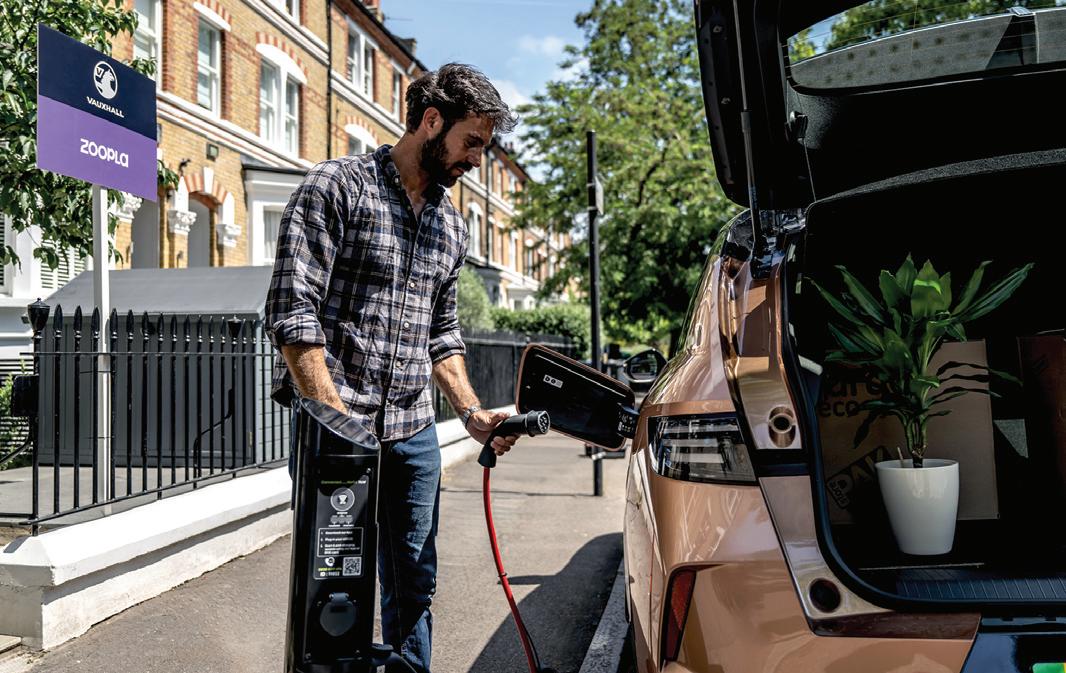

Daniel Copley, consumer expert, Zoopla, said: “We’re proud to be the first property website to offer consumers the ability to find the nearest onstreet chargers to a property, and filter properties with homecharging. Buyer requirements are constantly evolving as a result of factors like lifestyle changes and commuting patterns. By improving Zoopla’s search functionality, our aim is that we will empower more confident moving decisions, particularly for current and future EV owners.”

Chargepoint mapping and information provider Zapmap has launched a charging card that offers EV drivers a simpler way to pay for charging wherever they go.
Working with the Zapmap app, the card allows drivers to start a charge with a quick tap at compatible chargepoints.
Over 40,000 chargepoints across over 30 networks are already accessible for digital payments in the app.
“We’re here to help drivers charge with confidence and the new charging card makes that even easier,” said Melanie Shufflebotham, chief operating officer of Zapmap.
“Whether you’re using your phone or tapping your card, paying with Zapmap fits around your journey.”
How the Zapmap card works:
• drivers add their debit card details once in the Zapmap app and order your card
• the Zapmap charging card is tapped at supported chargers
• sessions and receipts appear automatically in the app.
The charging card is available to Zapmap Premium Annual subscribers for a small fee, with a roll-out to all Zapmap users later this summer.
Average UK homeowners stay in their property for around 17 years, which takes majority of current homebuyers well beyond the introduction of the forthcoming ban of new petrol and diesel car sales in 2030.
Vauxhall research reveals 40% of UK drivers said proximity to EV charging will be an influential factor for them when they next move house. One-third (33%) said that a lack of accessible EV charging would actually deter them from moving into a specific property – a figure that rises to
84% of electric vehicle drivers. More than half of respondents (54%) said they would find it useful if property websites showed the proximity of the nearest on-street EV charging points for individual listings. Through Electric Streets of Britain, a national database has been established so UK motorists who want to have on-street residential EV chargers installed near them can register their need. This information is passed on to local authorities in order to help inform decisions of where to allocate resources to install new chargers. So far, over 12,000 streets have been identified as needing kerbside charging.
Steve Catlin, managing director, Vauxhall, said: “Moving house is one of the biggest decisions most of us make in our lifetime, and anyone who’s done it knows how much effort can go into finding the perfect home. As EVs become an even more common sight on our roads, more and more people will be prioritising charging access when thinking about where to live.”



















